
Bitcoin Solutions
by Christopher Westra
How to Understand the Importance of Bitcoin by Exploring Specific Problems for Which Bitcoin Provides a Solution
This site is underway, feel free to explore below. You can also check out my other websites:
Bitcoin Poems (All Bitcoin Poems by Christopher)
The Bitcoin Effect (How Bitcoin Changes You)
Prosperity Poems (Over 100 Prosperity Poems by Christopher)
Add your email below to receive each new Bitcoin Solution as it's written! Learn about sound money and how it can transform your life.
Table of Contents
Jungle Tokens vs. Sun Circles: The Orangutans Find Financial Freedom
Weaving a Brighter Future: A Meerkat Tale of Financial Freedom
Frozen Funds, Fierce Spirit: Lily's Fight for Freedom with Bitcoin
“Don't Trust, Verify”: A Whisper that Revolutionized the Animal Kingdom
Captain Satoshi's Seashell Solution: Bringing Trust to Digital Transactions
Captain Satoshi's Seashell Solution: Bringing Trust to Digital Transactions
Anika's Tapestry and the Threads of Innovation: A Story of Bitcoin's Impact
Beyond the Tallykeeper's Reach: A Free Market Triumph in the Valley
The Minters and the Programmers: A Tale of Two Currencies
Oakhaven's Golden Goose: A Fable About Inflation and Opportunity
The Echoes of War: A Cautionary Tale of Inflation and Conflict
From Opaque to Open: How Honeycomb Creek Found Security in Transparency
The Shards of Hope: A Kingdom's Journey from Inflation to Equity
From Shifting Sands to Solid Ground: How a Village Gained Surety
The Weight of Gold vs. the Speed of Light: A Marketplace Transformed by Digital Currency
Beyond the Siren's Song: Bitcoin and the Fight Against Monetary Manipulation
Problem 17 - Home Affordability
A Fortress Against Inflation: The Star Anchor and the Dream of Home Ownership
Bitcoin to the Rescue: A Story of a Dentist Who Outwitted Inflation
Cracks in the Golden Chest: A Story of Broken Power and the Promise of Bitcoin
From Pebbles to Profits: A Playground Lesson in Economics
The Sandglass of Trust: A Tale of Peer to Peer Innovation in the Crimson Citadel
Evergold's Shadow: A Tale of Short-Term Thinking and the Bitcoin Revolution
Shiny Objects vs. the Golden Strategy: Lily and Max's Journey
The Curse of Plenty: A Story of Inflation and the Search for a Scarce Solution
Nighttime Grind: The Water Wheels that Saved the Day (and the Flour)
The Problems and Solutions Poems
Some of my Bitcoin Poems include my Problems and Solutions Series. These are written in specific format to help me succinctly describe a problem of fiat money and how Bitcoin fixes that problem.
I’ll list these here with links to the poems with a background. But I’ll add just the wording here. Each poem is in the shape of an arrow, with the first part describing the problem, and the last part describing the solution, with the center being a hinge point.
People and nations around the world experience these problems at different levels. For example, some nations experience horrific inflation that impacts their life at a deep level, and some wealthy people in countries with lower inflation may not feel the effects much. But each of these problems affects billions of people.
As you might expect, in nations that experience more of these problems, Bitcoin interest and adoption is much higher! In nations where censorship is not widely practiced yet, and financial systems are working somewhat smoothly, and inflation isn’t rampant, many people can’t see as much need or use for Bitcoin.
When Bitcoin solves a problem for three billion people, and you are one of the five billion who don’t experience that particular problem, you can’t say that Bitcoin isn’t a solution that is helping. That’s simply shortsighted and provincial..!
Problems and Solutions 1 - Debasement
You can see this full size poem on a background here.
Here is a small version.
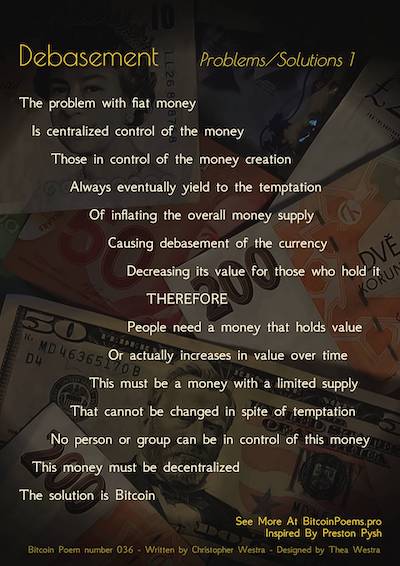
In the larger set of Bitcoin Poems, this Problem 1 Poem (Debasement) is Bitcoin Poem 036 – and was inspired by Preston Pysh
The problem with fiat money
Is centralized control of the money
Those in control of the money creation
Always eventually yield to the temptation
Of inflating the overall money supply
Causing debasement of the currency
Decreasing its value for those who hold it
Therefore
People need a money that holds value
Or actually increases in value over time
This must be a money with a limited supply
That cannot be changed in spite of temptation
No person or group can be in control
This money must be decentralized
The solution is Bitcoin
Here is a screenshot taken from Cato.org that shows the debasement of some currencies between January 1, 2020 and January 31, 2021, a little over a year.
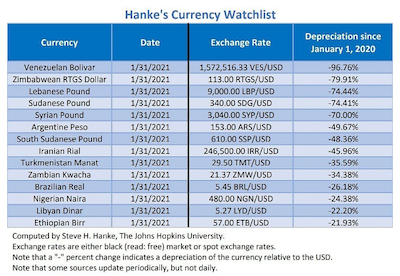
Source for the above chart - Cato.org.
Note that the depreciation is measured against the US Dollar, which is also depreciating! So the actual fall in value is even worse than what is pictured here. Problem number 1 (Debasement of the money supply) is at the root of many of the other problems.
Bitcoin addresses the issue of debasement of the money supply with fiat government currency units through its decentralized and deflationary nature. Unlike traditional fiat currencies that are subject to central bank control and government policies, Bitcoin operates on a decentralized network of nodes.
This means that no single entity, government, or institution has control over the issuance or manipulation of Bitcoin. The total supply of Bitcoin is capped at 21 million, making it immune to the inflationary pressures often associated with fiat currencies.
The decentralized nature of Bitcoin ensures that no central authority can arbitrarily increase the supply of Bitcoin, preventing the debasement of its value through inflation. In contrast, central banks have the power to print more money, leading to an increase in the money supply and, consequently, inflation.
Bitcoin's fixed supply fosters confidence among its users, as they are assured that their holdings won't be eroded over time due to inflation caused by unchecked money printing.
Moreover, the transparent and immutable nature of the Bitcoin blockchain provides a clear and verifiable record of all transactions. This transparency reduces the likelihood of corruption and manipulation in the financial system.
Bitcoin's decentralized and borderless nature also makes it resistant to geopolitical influences that can impact traditional currencies. This resilience further protects it from debasement caused by political or economic instability in any particular region.
In summary, Bitcoin's decentralization, fixed supply, transparency, and resistance to geopolitical influences collectively contribute to solving the problem of debasement in the money supply associated with fiat government currency units.
It offers a reliable alternative for individuals seeking a store of value that is not subject to the whims of centralized authorities and the risks of inflation.
Here is a story to illustrate.
Jungle Tokens vs. Sun Circles: The Orangutans Find Financial Freedom

In the heart of the whispering jungle, resided a troop of wise old Orangutans. They were the keepers of knowledge, their memories stretching back generations. Their greatest treasure, however, wasn't fruit or shiny stones, but a collection of colorful leaves called “Jungle Tokens.”
These tokens, once plentiful, represented the value of everything from woven vines to juicy mangoes. But lately, the Orangutans noticed something unsettling. The Great Monkey, the ruler who controlled the token printers, kept adding more and more leaves to the pile.
“More tokens for everyone!” the Great Monkey declared with a booming voice. But the Orangutans weren't fooled. The extra leaves diluted the value of the ones they already had. A single token, once enough for a basket of mangoes, could barely buy a single fruit. The elders worried, their once-comfortable lives becoming a struggle.
One day, a young, adventurous Gibbon swung into their clearing. He spoke of a revolutionary system called “Sun Circles,” a digital currency independent of any central authority. Intrigued, the Orangutans gathered around.
“Imagine,” the Gibbon chirped, “a system where no single monkey controls the money supply. Sun Circles are like fireflies in the night – limited in number and forever visible on a vast, glowing web.”
The Orangutan elders' eyes gleamed. “Limited numbers? No more inflation?”
The Gibbon nodded. “Sun Circles can't be printed at will. There's a finite number, ensuring their value remains strong. It's like the rarest, most precious fruit in the jungle, its worth never diminishing.”
Hope flickered in the Orangutans' wise eyes. With Sun Circles, their hard-earned tokens wouldn't lose value overnight. They could plan for the future, knowing their savings would retain their purchasing power.
News of Sun Circles spread through the jungle like wildfire. Soon, all the animals, from the lumbering Elephants to the scurrying Squirrels, were using them. The Great Monkey, threatened by the loss of his control, fumed and raged. But the tide had turned. The creatures of the jungle craved a system fair and transparent, one that protected their hard work.
Sun Circles, though new and unfamiliar, offered a beacon of stability. They promised a future where value wasn't dictated by a single ruler, but secured by a system beyond manipulation. And so, the Orangutans, with their wisdom and foresight, helped lead the jungle into a new era of financial freedom.
Problems and Solutions 2 - Availability
You can see this full size poem on a background here.
Here is a small version.
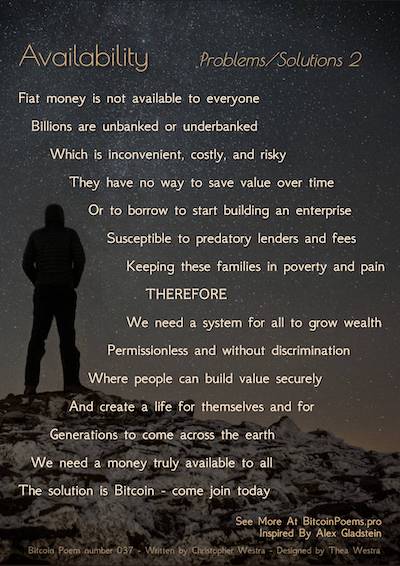
In the larger set of Bitcoin Poems, this Problem 2 Poem (Availability) is Bitcoin Poem 037 – and was inspired by Alex Gladstein
Fiat money is not available to everyone
Billions are unbanked or underbanked
Which is inconvenient, costly, and risky
They have no way to save value over time
Or to borrow to start building an enterprise
Susceptible to predatory lenders and fees
Keeping these families in poverty and pain
Therefore
We need a system for all to grow wealth
Permissionless and without discrimination
Where people can build value securely
And create a life for themselves and for
Generations to come across the earth
We need a money truly available to all
The solution is Bitcoin - come join today
According to the World Bank, around 1.4 billion adults worldwide are unbanked. This is close to one-fourth of the world's population.
See the image below to see which countries have more people using banking services, and which have largely unbanked populations.
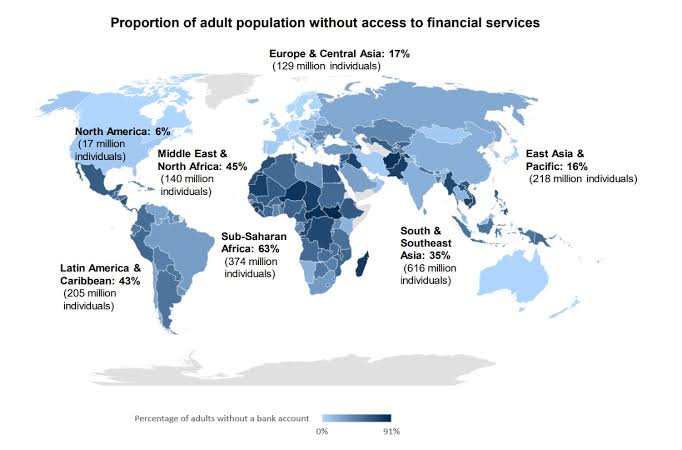
Bitcoin plays a crucial role in addressing the issue of financial inclusion by providing a decentralized and accessible financial system for the unbanked population around the world. A significant proportion of the global population, often referred to as the “unbanked,” lacks access to traditional banking services due to various reasons, such as living in remote areas, lacking proper identification, or facing exclusion based on economic status.
Bitcoin's decentralized nature allows individuals to participate in the global economy without the need for traditional banking infrastructure.
First, Bitcoin operates on a peer-to-peer network, enabling direct transactions between users without the need for intermediaries like banks. This eliminates the barriers that traditional banking systems impose, making financial services more readily available to those without access to traditional banks.
Anyone with an internet connection and a digital wallet can participate in the Bitcoin network, providing financial inclusion to the unbanked population.
Second, Bitcoin serves as a store of value and a means of transferring value across borders. In regions where traditional banking infrastructure is limited or nonexistent, individuals can use Bitcoin as a secure and efficient alternative for storing and transferring wealth. This is particularly impactful in areas where people face currency volatility, high inflation, or political instability, providing a more reliable and accessible financial option.
Third, the permissionless nature of Bitcoin allows individuals to create and manage their own digital wallets without relying on approval from financial institutions. This is particularly empowering for those who lack access to formal identification or credit history, as Bitcoin transactions are based on cryptographic keys rather than personal information.
Bitcoin's decentralized, borderless, and permissionless characteristics make it a powerful tool for promoting financial inclusion. It provides the unbanked population with access to a global financial system, allowing them to store value, engage in peer-to-peer transactions, and participate in economic activities without relying on traditional banking infrastructure.
This has the potential to uplift millions of individuals who have been excluded from the formal financial system, fostering economic empowerment and financial autonomy.
Here is a story to illustrate.
Weaving a Brighter Future: A Meerkat Tale of Financial Freedom

In the bustling animal market of Savannaborough, resided a family of meerkats – Papa Meerkat, Mama Meerkat, and their five energetic pups. They were skilled weavers, crafting baskets coveted by all creatures. Yet, their joy was dampened by the lack of a burrow bank.
The grand Savannah National Bank, run by the snooty Lion family, had a burrow door that remained firmly shut to the meerkats. They lacked the “proper paperwork,” a fancy term that left Papa Meerkat scratching his head. Without a burrow bank, the meerkats couldn't save their earnings or borrow to expand their weaving business.
Loan sharks, like the sly Hyena clan, lurked in the shadows, offering money at exorbitant rates. One bad deal and the meerkats could lose everything. Their woven dreams of a bigger burrow and a brighter future seemed to slip away with each passing sandstorm.
One day, a traveling Fennec Fox arrived, his fur shimmering with an otherworldly glow. He spoke of a revolutionary system called “Sunstones,” a digital currency independent of any burrow bank. Intrigued, the meerkats gathered around.
The Fennec Fox explained, “Sunstones are like shiny pebbles you can't hold, but everyone can see them on a special ledger. You can trade them with anyone, anywhere, without needing a fancy burrow bank or permission from grumpy lions.”
Mama Meerkat's eyes sparkled. “This means we can save our basket earnings as Sunstones, safe from hyenas!”
The Fennec Fox smiled. “Not just that! With Sunstones, you can borrow from others without outrageous interest rates. You can even use them to buy supplies from faraway markets!”
Papa Meerkat tilted his head. “But how do we get these Sunstones?”
The Fennec Fox winked. “All you need is a little burrow called a 'digital wallet' and an internet connection. It's open to everyone, meerkats, elephants, anyone!”
Hope bloomed in the meerkat family. With Sunstones, they could finally build their dream burrow, expand their business, and leave behind the clutches of loan sharks. The future, once shrouded in sand, shimmered with possibility.
News of Sunstones spread like wildfire throughout Savannaborough. Slowly, but surely, animals of all shapes and sizes began using them. The cheetahs, known for their lightning-fast deliveries, used Sunstones for secure, borderless transactions. The wise old owls, with their limited mobility, could now manage their savings digitally.
The Savannah National Bank, however, watched with suspicion. Their monopoly on burrows seemed threatened. But the tide had turned. The animals of Savannaborough craved a financial system that was fair, accessible, and built for everyone.
Sunstones, though a new concept, offered a beacon of hope, a chance for every creature to weave their own path to prosperity. The story of the meerkats became a legend, a reminder that even the smallest creatures could dream big and build a brighter future with a financial system that belonged to all.
Problems and Solutions 3 - Censorship
You can see this full size poem on a background here.
Here is a small version.
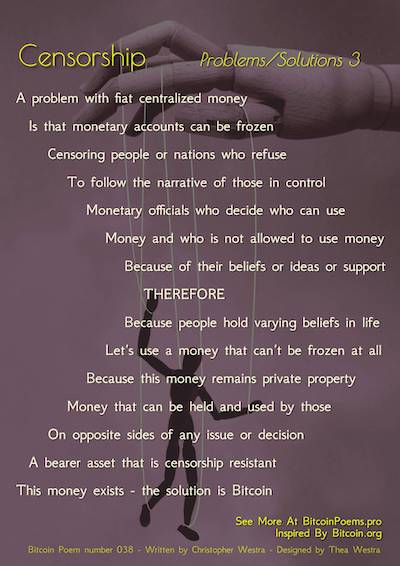
In the larger set of Bitcoin Poems, this Problem 3 Poem (Censorship) is Bitcoin Poem 038 – and was inspired by Bitcoin.org
A problem with fiat centralized money
Is that monetary accounts can be frozen
Censoring people or nations who refuse
To follow the narrative of those in control
Monetary officials who decide who can use
Money and who is not allowed to use money
Because of their beliefs or ideas or support
Therefore
Because people hold varying beliefs in life
Let’s use a money that can’t be frozen at all
Because this money remains private property
Money that can be held and used by those
On opposite sides of any issue or decision
A bearer asset that is censorship resistant
This money exists - the solution is Bitcoin
See the image below for some indication of press freedom vs. censorship in countries. I do believe more countries are moving toward censorship. This image is from VisualCapitalist.com.
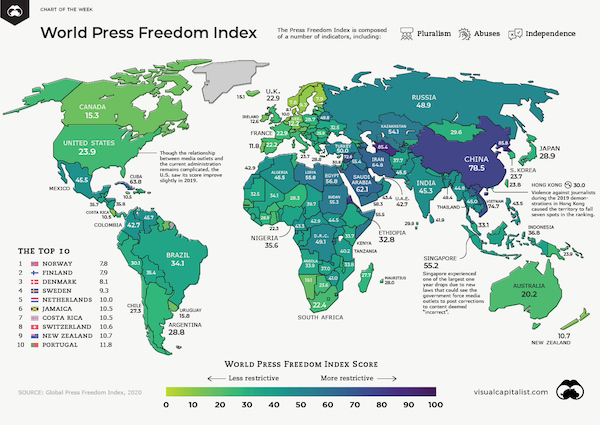
Bitcoin acts as a powerful tool against financial censorship by providing individuals with a censorship-resistant means of transacting and storing value. In various instances, governments or financial institutions may freeze assets or restrict financial transactions to enforce a particular narrative or political agenda.
Bitcoin, being decentralized and borderless, allows users to maintain control over their funds without the risk of censorship.
First, The decentralized nature of the Bitcoin network ensures that there is no single point of control or authority. Traditional financial systems often rely on centralized entities such as banks or governments, which can be influenced or coerced to freeze assets or block transactions. Bitcoin, on the other hand, operates on a peer-to-peer network of nodes globally, making it resistant to censorship attempts.
No central authority has the power to arbitrarily freeze or confiscate Bitcoin funds, providing individuals with financial autonomy.
Second, Bitcoin transactions are pseudonymous, meaning that users can conduct financial transactions without revealing their identities. This anonymity protects individuals from potential repercussions or censorship based on their beliefs, activities, or political affiliations. While the blockchain records all transactions, the identities of users are not directly tied to their wallet addresses, adding a layer of privacy that is absent in traditional financial systems.
Third, Bitcoin's borderless nature enables individuals to conduct transactions across international boundaries without being subject to the financial regulations of any specific jurisdiction. This is particularly important for those living in regions with oppressive regimes or where financial censorship is prevalent. Users can send and receive Bitcoin globally, bypassing restrictions imposed by local authorities and preserving their financial freedom.
Bitcoin provides a decentralized, pseudonymous, and borderless alternative to traditional financial systems, making it resistant to censorship. Users can transact and store value without fear of asset freezing or transaction blocking based on political or ideological reasons.
This empowers individuals to exercise their financial freedoms without being subject to the control of centralized entities, fostering a more open and censorship-resistant financial ecosystem.
Here is a story to illustrate.
Frozen Funds, Fierce Spirit: Lily's Fight for Freedom with Bitcoin

In the heart of a bustling city, there lived a young woman named Lily. Lily was a passionate advocate for free speech and individual rights, often speaking out against injustices and oppression. But her outspokenness had drawn the attention of powerful forces who sought to silence her.
One fateful day, Lily woke up to find her bank account frozen, her assets seized by those who disagreed with her beliefs. Shocked and dismayed, she realized the extent of financial censorship that could be wielded against those who dared to challenge the status quo.
Determined not to be silenced, Lily sought refuge in the world of Bitcoin. With its decentralized and censorship-resistant nature, Bitcoin offered her a lifeline in the face of adversity.
No longer beholden to centralized financial institutions, Lily took control of her financial destiny, embracing Bitcoin as a tool for empowerment and liberation. With Bitcoin, she could transact freely, without fear of censorship or reprisal.
As she delved deeper into the world of Bitcoin, Lily discovered a community of like-minded individuals who shared her values and beliefs. Together, they championed the cause of financial freedom, spreading the message of Bitcoin far and wide.
In the face of growing censorship and oppression, Bitcoin emerged as a beacon of hope for those who sought to challenge the status quo. Its decentralized and borderless nature ensured that no individual or entity could control or manipulate the flow of funds, providing a safe haven for those who valued their freedom above all else.
And so, armed with Bitcoin and a steadfast determination, Lily continued her fight for justice and equality, knowing that she had found a powerful ally in the battle against financial censorship. With Bitcoin by her side, she knew that no force in the world could silence the voice of truth and freedom.
Problems and Solutions 4 - Trust
You can see this full size poem on a background here.
Here is a small version.
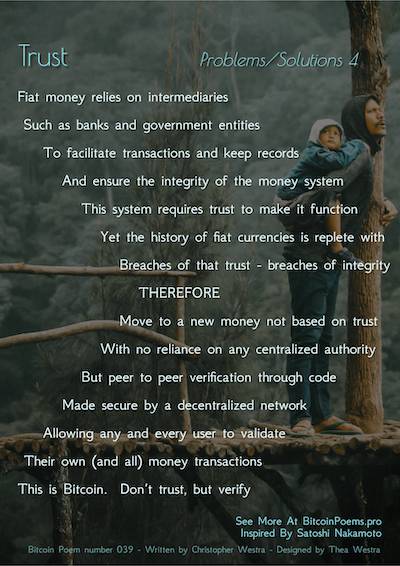
In the larger set of Bitcoin Poems, this Problem 4 Poem (Trust) is Bitcoin Poem 039 – and was inspired by Satoshi Nakamoto
Fiat money relies on intermediaries
Such as banks and government entities
To facilitate transactions and keep records
And ensure the integrity of the money system
This system requires trust to make it function
Yet the history of fiat currencies is replete with
Breaches of that trust - breaches of integrity
Therefore
Let’s move to a new money not based on trust
With no reliance on any centralized authority
But peer to peer verification through code
Made secure by a decentralized network
Allowing any and every user to validate
Their own (and all) money transactions
This is Bitcoin. Don’t trust, but verify.
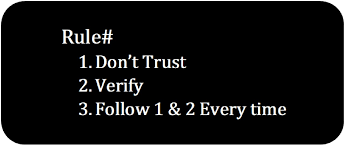
With fiat money, transactions are facilitated through banks and government entities, necessitating trust in these centralized authorities to maintain the integrity of the monetary system. However, this trust has often been betrayed throughout the history of fiat currencies, as Satoshi remarked in the Bitcoin White Paper, marked by breaches and instances of compromised integrity.
Bitcoin emerges as a transformative alternative, proposing a paradigm shift away from reliance on trust in centralized entities. The fundamental concept revolves around a decentralized network that operates on a peer-to-peer basis, cutting out the need for intermediaries. In this new monetary landscape, transactions are verified through code, and the security of the system is ensured by a decentralized network of nodes.
The call to “move to a new money not based on trust” reflects the ethos of Bitcoin, emphasizing the importance of verification over blind trust. By embracing a trustless system, users are empowered to validate their own transactions and contribute to the validation of the entire network. This trustless nature is encapsulated in the famous mantra associated with Bitcoin: “Don’t trust, but verify.” It encapsulates the philosophy that users can have confidence in the system not through blind trust but through the transparent and verifiable nature of blockchain technology.
In essence, Bitcoin represents a departure from the traditional financial model, offering a decentralized, transparent, and trustless framework that allows users to have greater control and verification over their financial transactions. This is a new era of financial autonomy and security.
Here is a story to illustrate.
“Don't Trust, Verify”: A Whisper that Revolutionized the Animal Kingdom

Once upon a time, in a lively forest where the sun always shone and the air was filled with the cheerful sounds of nature, there existed a grand clearing where animals from far and wide gathered to trade goods and services. At the heart of this bustling marketplace stood a majestic oak tree, its branches reaching skyward, a symbol of trust and integrity in the world of woodland commerce.
For generations, the creatures of the forest had placed their faith in the squirrels, who managed the treasures of the oak tree, entrusting them with their hard-earned acorns and relying on their guardianship to keep their wealth safe and secure. But as time passed, cracks began to appear in the facade of trust that had held the financial system together for so long.
Whispers of corruption and greed rustled through the leaves, tales of squirrels who hoarded acorns for themselves, and the foxes who manipulated the value of the forest's currency for their own gain. The once unshakable trust in the system began to falter, leaving the animals feeling vulnerable and exposed.
Amidst this uncertainty, a quiet revolution began to stir. A group of forward-thinking animals, led by a wise old owl, came together with a radical idea: to create a new form of currency that did not rely on trust in centralized authorities. They called it AcornCoin.
AcornCoin operated on a revolutionary concept known as the Treechain, a decentralized network of trees that verified and recorded transactions without the need for intermediaries like squirrels or foxes. Instead of placing blind faith in a central authority, users could verify the integrity of the system themselves, ensuring that every transaction was secure and transparent.
The mantra of this new monetary system was simple yet profound: “Don’t trust, but verify.” It encapsulated the philosophy that trust should not be blindly given but earned through transparency and verification.
As word spread of this groundbreaking innovation, animals from all walks of life flocked to embrace AcornCoin, drawn by its promise of financial autonomy and security. No longer did they have to rely on centralized institutions to safeguard their wealth; with AcornCoin, they could take control of their financial destinies and verify the integrity of every transaction themselves.
And so, in the grand marketplace of the forest, a new era of financial freedom dawned, fueled by the power of trustless technology and the unwavering belief that in a world of uncertainty, transparency and verification would always reign supreme.
Problems and Solutions 5 - Privacy
You can see this full size poem on a background here.
Here is a small version.
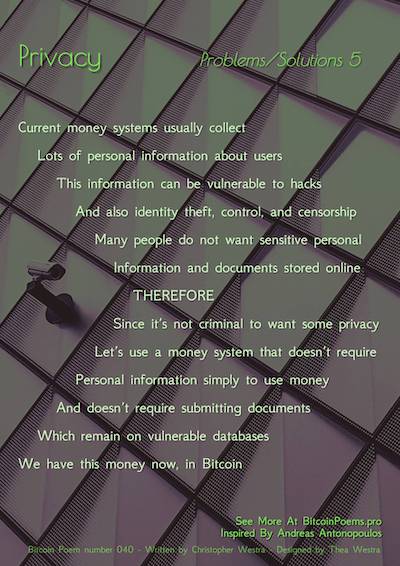
In the larger set of Bitcoin Poems, this Problem 5 Poem (Privacy) is Bitcoin Poem 040 – and was inspired by Andreas Antonopoulos
Current money systems usually collect
Lots of personal information about users
This information can be vulnerable to hacks
And also identity theft, control, and censorship
Many people do not want sensitive personal
Information and documents stored online
Therefore
Since it’s not criminal to want some privacy
Let’s use a money system that doesn’t require
Personal information simply to use money
And doesn’t require submitting documents
Which remain on vulnerable databases
We have this money now, in Bitcoin
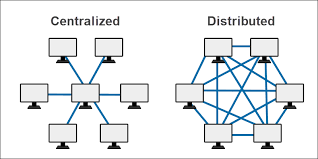
Bitcoin is a solution to financial privacy concerns. Here are some more specifics on how Bitcoin protects privacy:
Minimal Personal Information Requirement:
In traditional financial systems, individuals are often required to provide extensive personal information for transactions. This includes details such as names, addresses, and sometimes even social security numbers. Bitcoin transactions, on the other hand, do not require users to disclose their personal details. Bitcoin doesn’t care who uses the network, it can even be a computer, an alien, or a smart chimp.
Reduced Vulnerability to Hacks:
Traditional banking systems and online platforms storing personal information are susceptible to cyber attacks and hacks. Hackers know these centralized databases are “honeypots” of information. Bitcoin operates on a decentralized blockchain, making it more resistant to such attacks. The distributed nature of the blockchain ensures that there is no central point of failure, enhancing security.
Mitigation of Identity Theft:
The collection of extensive personal information in traditional systems can increase the risk of identity theft. Since Bitcoin transactions don't necessitate the disclosure of personal details, the potential for identity theft is significantly reduced.
Freedom from Centralized Control and Censorship:
Traditional financial systems are subject to centralized control, and authorities can impose censorship on transactions. Bitcoin operates on a decentralized network, providing users with more autonomy and preventing any single entity from controlling or censoring transactions.
User Preference for Privacy:
Many individuals are concerned about the storage of sensitive personal information online. Bitcoin, by design, allows users to maintain financial privacy without compromising security. This aligns with the preference of individuals who seek to keep their financial activities private.
Escape from “Criminalization of Privacy”:
Desiring financial privacy should not be considered a criminal act. Bitcoin allows users to conduct transactions without being subject to intrusive scrutiny, emphasizing the idea that privacy in financial matters is a basic right.
Absence of Document Submission:
Traditional financial transactions often require the submission of various documents, which are stored in centralized databases. Bitcoin transactions are document-free, eliminating the risk associated with storing sensitive information in vulnerable databases.
Here is a story to illustrate.
No More Prying Eyes! The Scurries Find Financial Freedom

Once upon a time, in a bustling town called Sunnyville, lived a family of squirrels – Papa Scurry, Mama Scurry, and their two energetic kits, Pip and Pop. Every week, Papa Scurry would visit the grand Hazelnut Bank to trade his hard-earned acorns for shiny hazelnuts.
At the bank, a grumpy badger named Mr. Ledger always asked Papa Scurry for mountains of documents – proof of address, nut-gathering permits, and even their family recipe for the best acorn pie! Pip and Pop found it strange. “Why does Mr. Ledger need to know everything about us?” they'd ask.
One day, a sly fox named Fibber overheard their conversation. “Aha! That information is valuable, little ones,” he cackled. “He uses it to track your every purchase and tell everyone what you buy!” Pip and Pop were worried. They didn't like the idea of Mr. Badger knowing all their acorn-spending secrets.
Then, one sunny afternoon, a wise old owl named Hootington visited the Scurries. He told them about a new system called “Bitcoin” where squirrels could trade acorns without showing any documents or revealing their names. Their transactions were recorded in a giant, public ledger called a “blockchain,” safe from sneaky foxes like Fibber.
Pip and Pop were amazed! No documents, no prying eyes! This was perfect. Papa Scurry was cautious at first, but he liked the idea of keeping his financial life private. Soon, more and more squirrels in Sunnyville started using Bitcoin. They appreciated the freedom and security it offered.
Mr. Ledger wasn't happy though. Fewer squirrels were visiting his Hazelnut Bank, and he couldn't track their purchases anymore. He grumbled and complained, but the squirrels knew they had a right to privacy.
Using Bitcoin, the Scurries could still buy all their favorite things without anyone knowing their business. Sunnyville became a place where squirrels had control over their own finances, and everyone lived happily ever after (with plenty of delicious acorns to share)!
Problems and Solutions 6 - Finality
You can see this full size poem on a background here.
Here is a small version.
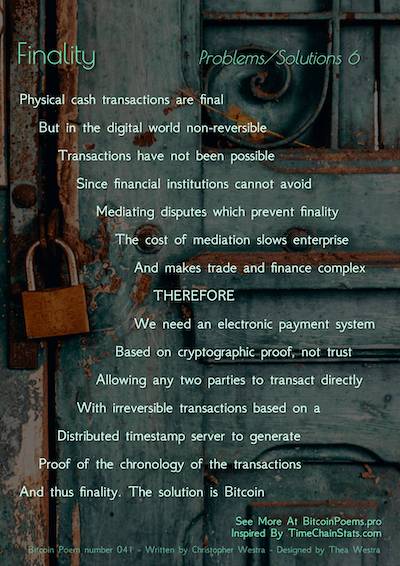
In the larger set of Bitcoin Poems, this Problem 6 Poem (Finality) is Bitcoin Poem 041 – and was inspired by TimeChainStats.com
Physical cash transactions are final
But in the digital world non-reversible
Transactions have not been possible
Since financial institutions cannot avoid
Mediating disputes which prevent finality
The cost of mediation slows enterprise
And makes trade and finance complex
Therefore
We need an electronic payment system
Based on cryptographic proof, not trust
Allowing any two parties to transact directly
With irreversible transactions based on a
Distributed timestamp server to generate
Proof of the chronology of the transactions
And thus finality. The solution is Bitcoin
Chargebacks cost billions of dollars each year, and are mostly borne by the merchants.
The flowchart below shows the many steps required when non-final payments are disputed (sometimes frivolously).
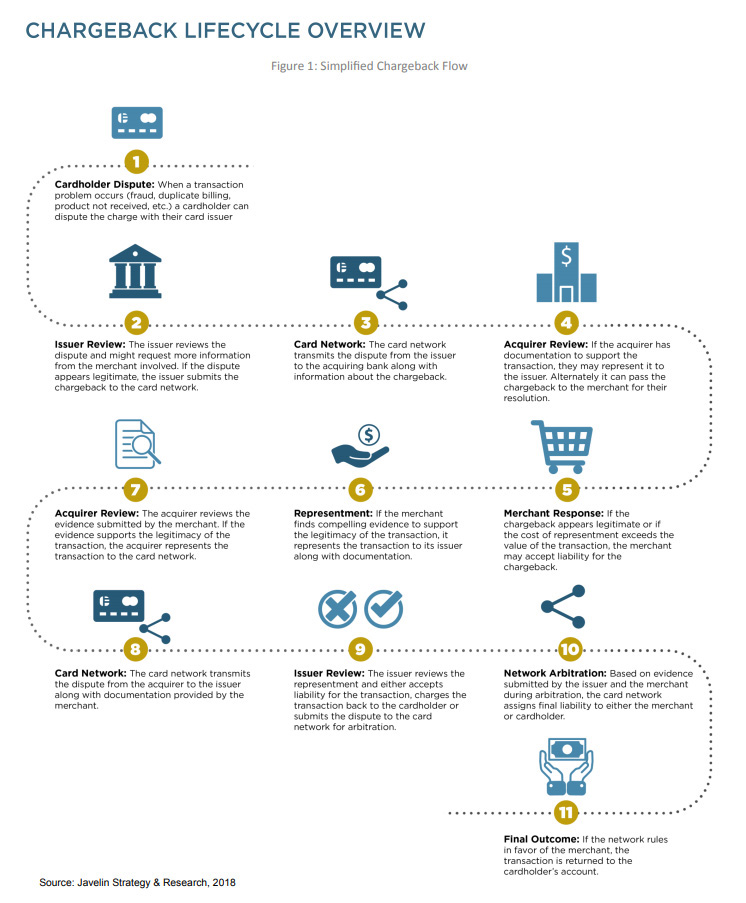
Image above from Payment Cards and Mobile Website
While physical cash offers instant and irreversible finality, digital transactions have historically lacked this crucial element. Traditional financial institutions act as trusted intermediaries, settling disputes and mediating transactions, but at the cost of slowness, complexity, and fees.
Imagine the frictionless exchange of value, like handing over cash, but instantaneously across borders and without middlemen – that's the promise of Bitcoin's finality solution.
Through its ingenious design, Bitcoin eliminates the need for trust by relying on cryptographic proof, not promises or intermediaries. Every transaction is validated by the network of distributed miners, who compete to secure the network and earn the right to add new blocks to the blockchain.
Once a block is added, the transactions within it become cryptographically linked to all previous blocks, creating an immutable and publicly verifiable record. This distributed timestamp server ensures the irreversible chronology of transactions, guaranteeing unprecedented finality in the digital world.
No amount of dispute or manipulation can undo a confirmed Bitcoin transaction. This removes the need for slow and expensive mediations, simplifies international trade and finance, and opens up a world of faster, cheaper, and more secure financial interactions. With Bitcoin, finality becomes inherent in the system itself, a powerful testament to the transformative potential of cryptographic innovation.
Bitcoin not only streamlines trade and finance but also introduces a level of efficiency and transparency previously unattainable in the digital financial landscape.
The End of Disputes: How Bitcoin Secured a Baker's Business
Once upon a time, in a bustling town where the streets echoed with the chatter of merchants and the clinking of coins, there lived a humble baker named Thomas. Thomas prided himself on his freshly baked bread, which drew customers from far and wide.
One day, a traveler passing through the town stopped by Thomas's bakery and purchased a loaf of bread with a shiny gold coin. The transaction was swift and seamless, with Thomas handing over the bread and the traveler handing over the coin in return. In an instant, the exchange was complete, and both parties went on their way.
As Thomas watched the traveler disappear into the distance, he marveled at the simplicity and finality of the transaction. With physical cash, there was no need for intermediaries or disputes – the exchange was instant and irreversible, leaving no room for uncertainty.
But Thomas knew that in the digital world, transactions were not always so straightforward. Without the tangibility of physical cash, disputes could arise, and intermediaries were often needed to settle disagreements. This slowed down trade and commerce, making transactions complex and costly.
Determined to find a solution, Thomas turned to the world of Bitcoin. Bitcoin offered a revolutionary electronic payment system based on cryptographic proof, not trust. With Bitcoin, any two parties could transact directly, with irreversible transactions guaranteed by a distributed timestamp server.
Inspired by the promise of finality that Bitcoin offered, Thomas embraced the digital currency with open arms. No longer did he need to rely on intermediaries or worry about disputes – every Bitcoin transaction was cryptographically secured and immutable, ensuring that once a transaction was confirmed, it was final.
As Thomas continued to bake his bread and serve his customers, he marveled at the efficiency and simplicity of Bitcoin. With its innovative design, Bitcoin had transformed the world of digital transactions, ushering in a new era of finality and security.
And so, in a world where trust was often elusive and disputes were common, Bitcoin stood as a beacon of hope, offering a solution to the age-old problem of finality in the digital realm. With Bitcoin, transactions became not just efficient, but truly final – a testament to the power of cryptographic innovation.
Here is another little parable to further show the benefits of finality.
Captain Satoshi's Seashell Solution: Bringing Trust to Digital Transactions

In the bustling port city of Shimmer Bay, merchants bartered and traded using colorful seashells. Once a deal was struck, the shells were handed over, and the transaction was final. No take-backs, no arguments. But across the shimmering bay, a new city, Digiport, had sprung up. Here, transactions were conducted digitally, with promises whispered through glowing orbs.
However, these digital promises were far from final.
Merchants in Digiport often faced disputes. “The promised payment never arrived!” a disgruntled fishmonger would shout. The resolution process was slow and cumbersome, with wise elders spending days poring over records to determine the truth. Trade stagnated, held back by the uncertainty of unfinalized transactions.
One day, a curious sailor named Captain Satoshi arrived in Digiport. He spoke of a revolutionary system – a digital ledger maintained not by a single authority, but by everyone in the city. Each transaction was like a seashell, permanently etched into the ledger, visible to all.
No more broken promises, no more endless debates.
The merchants of Digiport were skeptical at first. Could a system without a central authority truly work? But Captain Satoshi explained how powerful computers called “miners” would compete to secure the ledger, adding new transactions and ensuring their finality. Once a transaction was etched into the ledger, it was set in stone, just like a seashell changing hands in Shimmer Bay.
Intrigued, the merchants of Digiport decided to give it a try. Soon, the city buzzed with activity. Transactions were completed swiftly and securely, without the need for slow and costly mediations. Trade flourished as merchants no longer feared the ghosts of unfulfilled promises.
The finality of Captain Satoshi's system, much like the finality of the seashells, brought trust and efficiency back to Digiport's digital marketplace.
And so, in a world where trust was often elusive and disputes were common, Bitcoin stood as a beacon of hope, offering a solution to the age-old problem of finality in the digital realm. With Bitcoin, transactions became not just efficient, but truly final – a testament to the power of cryptographic innovation.
Problems and Solutions 7 - Fees
You can see this full size poem on a background here.
Here is a small version.
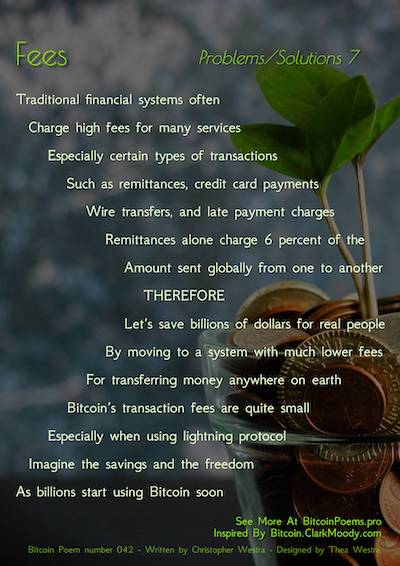
In the larger set of Bitcoin Poems, this Problem 7 Poem (Fees) is Bitcoin Poem 042 – and was inspired by the Clark Moody Bitcoin Dashboard at Bitcoin.ClarkMoody.com
Traditional financial systems often
Charge high fees for many services
Especially certain types of transactions
Such as remittances, credit card payments
Wire transfers, and late payment charges
Remittances alone charge 6 percent of the
Amount sent globally from one to another
Therefore
Let’s save billions of dollars for real people
By moving to a system with much lower fees
For transferring money anywhere on earth
Bitcoin’s transaction fees are quite small
Especially when using lightning protocol
Imagine the savings and the freedom
As billions start using Bitcoin soon
The Chart below shows the top 10 countries for inward remittances (Billions of Dollars - 2017).
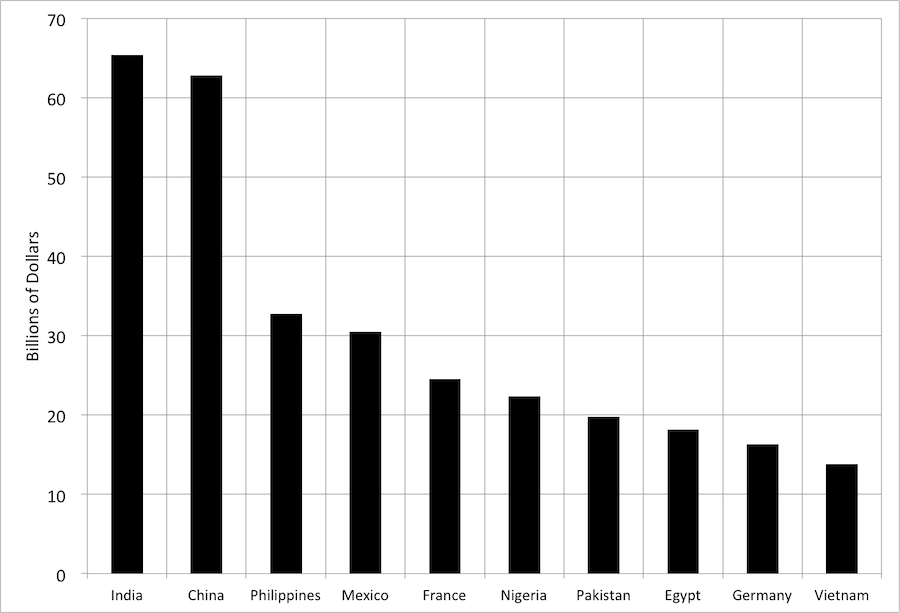
The chart above is from the Money and Banking Website (ultimately sourced from the World Bank - 2017)
Bitcoin presents an opportunity to significantly reduce financial fees compared to traditional systems. With its decentralized nature and innovative technology, Bitcoin transactions typically incur lower fees, especially when utilizing protocols like the Lightning Network.
By leveraging Bitcoin for money transfers, individuals can potentially save substantial amounts of money, particularly on services like remittances, wire transfers, and credit card payments, where fees can be notably high.
This shift to Bitcoin has the potential to generate significant savings for users globally and promote greater financial inclusivity by reducing barriers to accessing affordable financial services.
Here is a little story to illustrate.
Anika's Tapestry and the Threads of Innovation: A Story of Bitcoin's Impact

In a bustling marketplace filled with colorful fabrics and fragrant spices, lived Anika, a weaver known for her beautiful tapestries. Each month, a portion of her earnings went to her family back in a distant village. Sending this money, called a remittance, was always a bittersweet affair.
While Anika wanted to support her loved ones, the fees charged by the money transfer service felt like a heavy tax on her hard work. 6% of every transaction seemed to vanish into thin air, leaving less for her family and a knot of frustration in Anika's stomach.
One day, a traveling merchant named Jafar arrived at the market. Jafar spoke of a new system, a digital currency called Bitcoin, that promised to change things. He explained that Bitcoin transactions were faster, more secure, and most importantly, much cheaper than traditional methods.
Anika was skeptical at first, but listened intently as Jafar described how Bitcoin's fees were minimal, especially when using something called the Lightning Network.
Intrigued, Anika decided to try it. Her first Bitcoin remittance was a revelation. The transaction was completed within minutes, and the fees were a fraction of what she usually paid. The joy of sending money to her family was amplified by the extra resources it left behind.
News of Anika's experience spread like wildfire through the marketplace. Soon, other vendors were trying Bitcoin for their own transactions. The marketplace buzzed with excitement as people discovered the freedom and savings offered by this new system. They could finally focus on their businesses and families, without a significant portion of their earnings disappearing into fees.
As more people embraced Bitcoin, the marketplace flourished. The money saved on transactions translated into new investments, vibrant stalls, and a sense of empowerment among the vendors. Anika, once burdened by fees, now used Bitcoin to not only support her family but also expand her weaving business.
The story of Anika and the marketplace is a glimpse into a future where financial systems work for the people, not the other way around. With Bitcoin, the power to move money around the world becomes faster, cheaper, and accessible to all.
Problems and Solutions 8 - Distortion
You can see this full size poem on a background here.
Here is a small version.
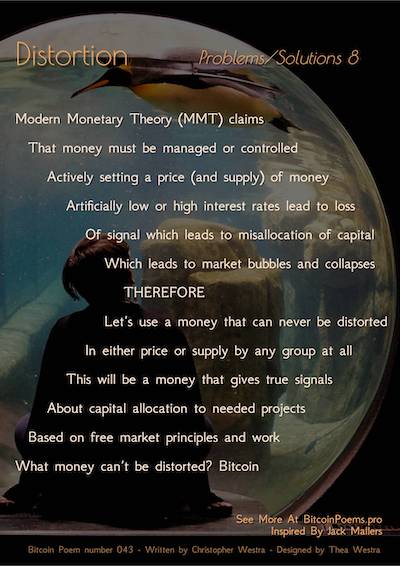
In the larger set of Bitcoin Poems, this Problem 8 Poem (Distortion) is Bitcoin Poem 043 – and was inspired by Jack Mallers
Modern Monetary Theory (MMT) claims
That money must be managed or controlled
Actively setting a price (and supply) of money.
Artificially low or high interest rates lead to loss
Of signal which leads to misallocation of capital
Which leads to market bubbles and collapses
Therefore
Let’s use a money that can never be distorted
In either price or supply by any group at all
This will be a money that gives true signals
About capital allocation to needed projects
Based on free market principles and work
What money can’t be distorted? Bitcoin
Chart showing the credit bubble of 2008/2009, and the subsequent financial crisis.
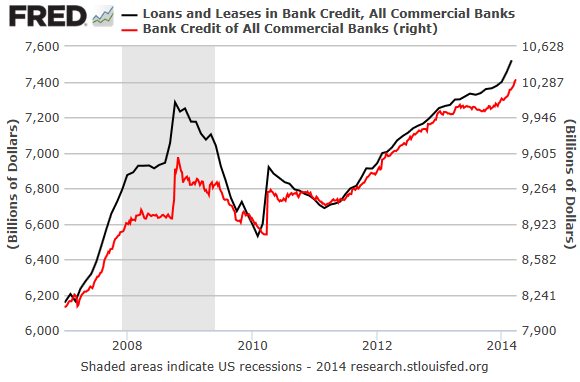
The chart above is from the Wolf Street Website, originally from the St. Louis Fed
Modern Monetary Theory (MMT), advocates for active management and control of currency, including the manipulation of interest rates to steer economic activity. However, critics argue that such interventions often lead to distortions in the market signals, resulting in misallocations of capital, market bubbles, and subsequent collapses.
A money system more immune to such manipulations would provide more accurate signals for capital allocation, promoting a healthier, more stable economic environment.
Bitcoin includes a decentralized ledger (and consensus) and fixed supply. Operating outside the influence of any central authority, Bitcoin's price and supply are determined mostly by market forces. This characteristic renders it resistant to manipulation and distortion, offering a potential solution to the shortcomings associated with traditional fiat currencies.
Advocates of Bitcoin hold it up as a means for true market signals to prevail, fostering a more transparent and efficient allocation of resources. In this vision, Bitcoin represents not only a currency but also a symbol of economic freedom and a beacon for those seeking to mitigate the distortions often inherent in centralized monetary systems.
Here is a story to illustrate:
Beyond the Tallykeeper's Reach: A Free Market Triumph in the Valley

In a valley nestled between snow-capped peaks lived two tribes: the Makers and the Takers. The Makers thrived on innovation and hard work. They built intricate tools, tilled fertile fields, and traded their goods with other valleys. Their currency was simple: clay tokens representing a day's labor.
The Takers, on the other hand, were ruled by the Grand Tallykeeper. He controlled a vast store of gold coins, the only currency accepted. The Tallykeeper believed his role was to actively manage the economy.
When harvests were bountiful, he'd declare the gold more valuable, making it harder for Makers to obtain loans for new tools. This, he claimed, prevented inflation. Conversely, during lean years, he'd flood the market with gold, making loans easier but risking a future price collapse.
This constant tinkering backfired. True signals of need were lost in the artificial ebb and flow of gold. The Makers, unsure of the future value of their labor, became hesitant to invest in long-term projects. Bubbles formed in short-term ventures, then burst, leaving a trail of wasted resources.
One Maker, a young woman named Elara, noticed a hidden valley rumored to hold a rare metal, Adamantine. Perfect for tools, Adamantine could revolutionize their work. But obtaining loans in the Taker's gold market was too risky for such a long-term venture.
Elara proposed a new system: time tokens. Each token represented a set amount of future labor, freely tradable amongst the Makers. With these tokens, Elara could secure investment from fellow Makers who believed in Adamantine's potential. The risk and reward were clear, based solely on the perceived value of the project, not the whims of the Grand Tallykeeper.
The time token system spread like wildfire. Innovation flourished. The discovery of Adamantine, funded by the free market, propelled the Makers into a golden age. The Takers, clinging to their gold and outdated system, watched with envy.
Elara's story became a legend, a testament to the power of a currency that reflected true value and empowered the people to allocate resources efficiently. It was a system based on work, not manipulation, a constant reminder that the best signal for an economy is the collective will of its makers.
Problems and Solutions 9 - Sound Money
You can see this full size poem on a background here.
Here is a small version.
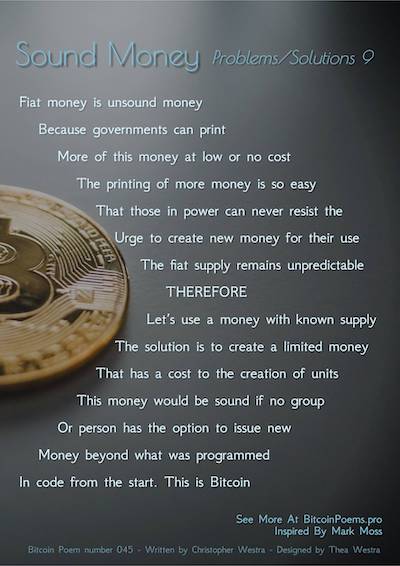
In the larger set of Bitcoin Poems, this Problem 9 Poem (Sound Money) is Bitcoin Poem 045 – and was inspired by Mark Moss.
Fiat money is unsound money
Because governments can print
More of this money at low or no cost
The printing of more money is so easy
That those in power can never resist the
Urge to create new money for their use
The fiat supply remains unpredictable
Therefore
Let’s use a money with known supply
The solution is to create a limited money
That has a cost to the creation of units
This money would be sound if no group
Or person has the option to issue new
Money beyond what was programmed
In code from the start. This is Bitcoin
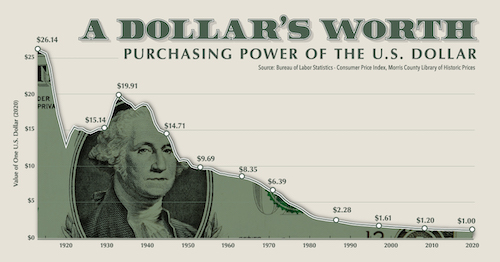
Fiat money, often criticized as unsound, derives its value from government decree rather than intrinsic worth. One of the primary criticisms of fiat currency lies in its susceptibility to manipulation, particularly through the process of money creation.
Governments possess the authority to print more money at relatively low or no cost, leading to an increase in the money supply. This ease of money creation can tempt those in power to pursue policies that prioritize short-term gains over long-term stability, resulting in inflation and economic uncertainty. The unpredictable nature of fiat money's supply undermines its credibility as a store of value and a medium of exchange.
In contrast, proponents of alternative monetary systems, such as Bitcoin, advocate for a more disciplined approach to money creation. Bitcoin operates on a decentralized network, governed by a predetermined set of rules embedded in its code. The supply of Bitcoin is limited, with a maximum cap of 21 million coins, ensuring scarcity akin to precious metals like gold.
Moreover, the creation of new Bitcoin units, known as mining, requires significant computational resources, introducing a cost to the process. This system of controlled supply and costly creation gives Bitcoin the characteristics of sound money, free from the whims of any central authority or government.
Advocates argue that Bitcoin's transparent and predictable monetary policy offers a more reliable foundation for economic transactions and long-term wealth preservation.
Here is a story to illustrate:
The Minters and the Programmers: A Tale of Two Currencies

In a bustling town nestled between rolling hills, there lived two groups of people: the Minters and the Programmers. The Minters, led by the Master Mint, controlled the production of coins in the town. They had the power to print more coins whenever they pleased, with little regard for the consequences.
On the other side of town, the Programmers, led by the Wise Coder, believed in a different approach to money. They saw the flaws in the Minter's system and advocated for a new kind of currency, one with a fixed supply and a cost to its creation.
The Master Mint, enamored by the allure of endless coins, often succumbed to the temptation to print more money. With each new coin minted, the value of the existing coins dwindled, leading to uncertainty and instability in the town's economy.
Meanwhile, the Wise Coder diligently worked on creating a digital currency called Bitcode. Bitcode was designed with a predetermined supply, much like a precious metal buried deep in the earth. The Wise Coder embedded strict rules in the code, ensuring that no one, not even the most powerful, could create more Bitcode beyond what was initially programmed.
As time passed, the flaws in the Minter's system became increasingly apparent. Inflation ran rampant, and the townsfolk grew weary of the ever-decreasing value of their coins. They longed for stability and predictability in their monetary system.
One day, the Wise Coder unveiled Bitcode to the townsfolk. They marveled at its elegance and simplicity, for it offered a solution to their woes. With its fixed supply and cost to creation, Bitcode provided a foundation of sound money that the town had never known.
Inspired by the promise of Bitcode, the townsfolk rallied behind the Wise Coder's vision. They embraced a new era of financial responsibility and stability, free from the whims of the Master Mint and his endless printing press.
As the sun set over the town, casting a warm glow upon its streets, the people knew that they had found a true solution to the problem of unsound money. And it all began with a few lines of code and a dream of a better future.
Problems and Solutions 10 - Wealth Gap
You can see this full size poem on a background here.
Here is a small version.
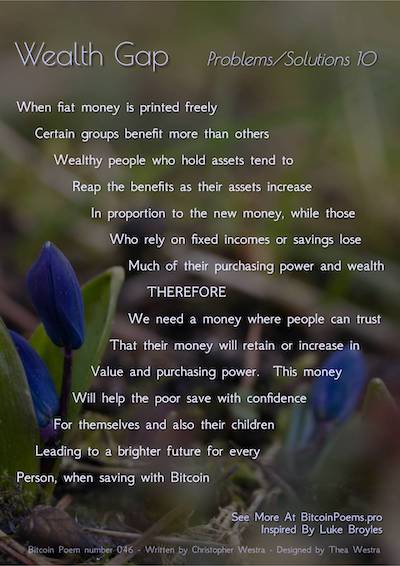
In the larger set of Bitcoin Poems, this Problem 10 Poem (Sound Money) is Bitcoin Poem 046 – and was inspired by Luke Broyles.
When fiat money is printed freely
Certain groups benefit more than others
Wealthy people who hold assets tend to
Reap the benefits as their assets increase
In proportion to the new money, while those
Who rely on fixed incomes or savings lose
Much of their purchasing power and wealth
Therefore
We need a money where people can trust
That their money will retain or increase in
Value and purchasing power. This money
Will help the poor save with confidence
For themselves and also their children
Leading to a brighter future for every
Person, when saving with Bitcoin
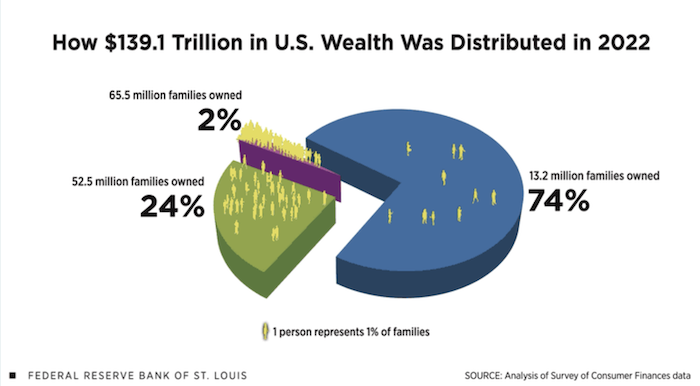
Image from the St. Louis Fed Website
In most countries we have a disparity perpetuated by the unrestricted printing of fiat money, where the wealthy thrive on the inflation of their assets while those dependent on fixed incomes or savings suffer the erosion of their wealth. Bitcoin provides a solution, offering a decentralized store of value that can restore trust in the stability and purchasing power of money.
With Bitcoin, individuals can save with confidence, knowing that their wealth won't be subject to arbitrary devaluation through inflation. This empowerment extends beyond the present generation, as the ability to save and accumulate wealth securely enables families to invest in the future prosperity of their children. By providing a reliable store of value, Bitcoin holds the promise of narrowing the wealth gap and fostering a more equitable society.
In embracing Bitcoin, individuals gain control over their financial destinies, free from the whims of centralized authorities. This shift towards a decentralized currency not only promotes financial inclusion but also lays the groundwork for a brighter and more equitable future for all.
As more people recognize the potential of Bitcoin to mitigate the wealth gap, its adoption could catalyze meaningful socioeconomic transformation, ushering in an era of prosperity and opportunity for generations to come.
Here is a story to illustrate:
Oakhaven's Golden Goose: A Fable About Inflation and Opportunity

In the bustling village of Oakhaven, nestled between rolling hills, lived two extended families: the Thriftys and the Earners. The Thriftys, wise and cautious, saved a portion of their earnings each year. Their savings were kept in clay jars, a symbol of their hard work and future security.
The Earners, a hardworking family, focused on putting food on the table and keeping a roof overhead. They had little left over to save, but their income was steady, allowing them to comfortably purchase the necessities.
One sunny morning, a royal decree arrived in Oakhaven. The King, facing a shortage of gold for his grand projects, announced the printing of more money!
The villagers rejoiced. More money meant more to spend, right?
However, the new money went to the King’s projects, and the special groups who bid for those projects. The newly printed money went to those already wealthy, and those who held the King’s favor.
So over time, a shadow crept in. The newly printed money, plentiful but not backed by anything of real value, began to lose its purchasing power. The same basket of vegetables that cost a few coins a month ago now required double the amount. The Thriftys realized their buying power had shrunk. Their clay jars, once overflowing with security, now held less value.
The Earners, reliant on their fixed income, were hit even harder. Their wages remained the same, but they could buy less and less with each passing month. Their dreams of saving for their children's education seemed to slip further away.
The King, oblivious to the suffering he caused, continued printing more money. The wealthy merchants, who owned land and other assets, saw their wealth increase proportionally to the new money. The gap between rich and poor widened.
One day, a young villager named Anya, known for her curiosity, returned from a faraway journey with tales of a strange new currency called Bitcoin. Unlike the King's ever-inflating money, Bitcoin had a limited supply, similar to precious metals. Its value was determined by trust and a complex system, not a royal decree.
Anya's stories sparked a new awakening in Oakhaven. People yearned for a currency they could trust, one that wouldn't erode their savings or widen the wealth gap. Slowly, the villagers began to understand Bitcoin's potential. It offered a glimmer of hope, a chance to save with confidence and build a brighter future, not just for themselves but for their children.
The story of Oakhaven serves as a cautionary tale about the dangers of unbacked fiat money and the potential of Bitcoin to create a more equitable system. With a limited and predictable supply, Bitcoin empowers individuals to take control of their financial destinies and build a future where saving isn't a gamble, but a path towards prosperity.
Problems and Solutions 11 - War
You can see this full size poem on a background here.
Here is a small version.
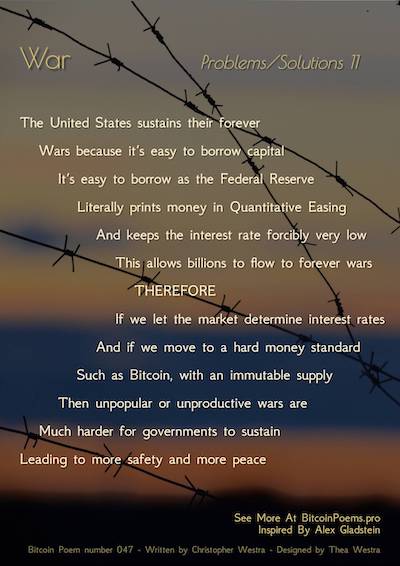
In the larger set of Bitcoin Poems, this Problem 11 Poem (War) is Bitcoin Poem 047 – and was inspired by Alex Gladstein.
The United States sustains their forever
Wars because it’s easy to borrow capital
It’s easy to borrow as the Federal Reserve
Literally prints money in Quantitative Easing
And keeps the interest rate forcibly very low
This allows billions to flow to forever wars
Therefore
If we let the market determine interest rates
And if we move to a hard money standard
Such as Bitcoin, with an immutable supply
Then unpopular or unproductive wars are
Much harder for governments to sustain
Leading to more safety and more peace
The chart below shows overseas "operations" from 2001 to 2019.
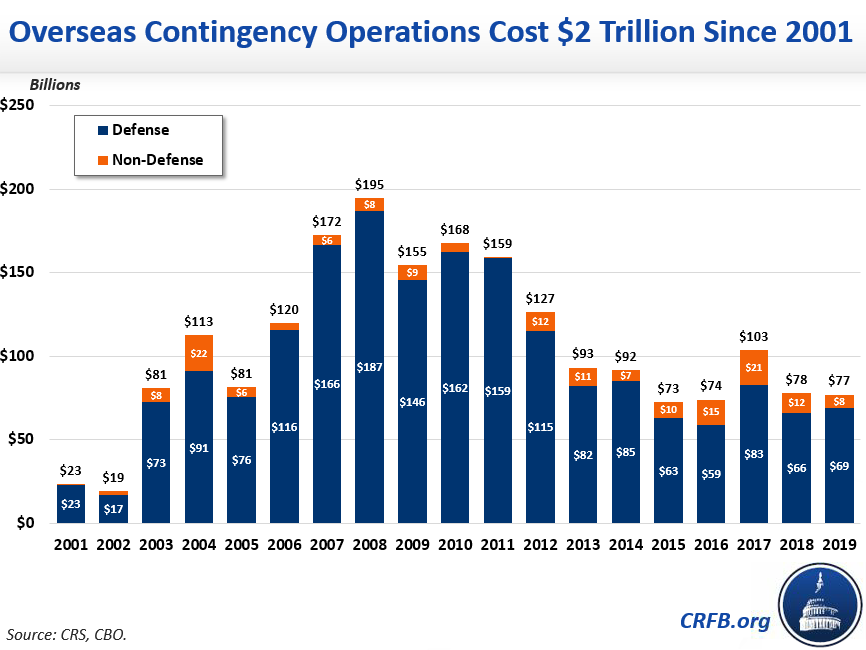
Chart above is from the Committee for a Responsible Federal Budget Website
Under the current system, central banks like the Federal Reserve can implement policies such as quantitative easing and artificially low interest rates to inject liquidity into the economy, making it easier for governments to borrow money for military endeavors. This easy access to capital, combined with the lack of fiscal discipline, has enabled governments to engage in unpopular or unproductive wars for extended periods.
Transitioning to a hard money standard, where the supply of currency is fixed and determined by market forces rather than centralized institutions, could significantly alter this dynamic. In such a system, governments would no longer have the ability to simply print money or manipulate interest rates to fund their military ventures.
Instead, they would be constrained by the finite supply of money and subject to the discipline of market-driven interest rates.
By removing the ability of governments to finance wars through inflationary measures and easy borrowing, a hard money standard can make unpopular or unproductive wars economically unsustainable.
Without the ability to simply create money out of thin air, governments would be forced to rely on direct taxation or budget reallocations to fund military endeavors, making it much more difficult to sustain prolonged conflicts.
In this way, a hard money standard has the potential to promote peace and security by limiting the financial resources available for warfare. By aligning economic incentives with the pursuit of peace, such a system could help foster a more stable and harmonious international order, where conflicts are resolved through diplomacy and negotiation rather than military force.
Here is a story to illustrate:
The Echoes of War: A Cautionary Tale of Inflation and Conflict

In a bustling village nestled between rolling hills, life was peaceful for a time. The villagers, known for their craftsmanship and resourcefulness, thrived through trade and cooperation. However, a shadow loomed on the horizon. A neighboring village, fueled by whispers of an endless wellspring of gold, began to stir trouble.
This neighboring village had a peculiar system. Instead of using coins minted from precious metals like the one the craftsmen used, they relied on “promise notes.” These notes were issued by a central well, and their value hinged on the promise that more notes could be created whenever needed.
Tempted by the allure of easy wealth, the neighboring village embarked on an ambitious campaign of expansion. They hired foreign fighters, built grand fortifications, and financed it all with a constant flow of new promise notes.
At first, the craftsmen's village prospered further. The demand for their goods from the expanding neighbor was high. But a disquieting trend emerged. As more and more notes were printed, each one seemed to buy less. The price of simple goods began to climb, and whispers of discontent rose amongst the villagers.
The elders, wise and cautious, knew the dangers of such a system. With each new promise note, the real value of the existing ones dwindled. It was like a never-ending well that, instead of water, produced a shimmering illusion of wealth.
One day, a young apprentice named Lance returned from a trade mission to the neighboring village. His eyes were wide with worry. “They're planning a war,” he reported, “and they're counting on their endless notes to finance it.”
The elders knew they had to act. They gathered the villagers and explained the precarious situation. “Their war may bring them temporary gain,” they warned, “but the cost will be borne by everyone, through ever-rising prices and a dwindling supply of true value.”
The villagers, valuing their peaceful lives and hard-earned wealth, decided to take a stand. They proposed a new system, with new monetary units based on work, their value derived from the metal they were made of. Since this metal was hard to obtain, this “hard money,” as they called it, wouldn't be subject to inflation or manipulation.
The neighboring village scoffed at their proposal. But as time passed, the cracks in their own system began to show. The war they financed dragged on, their promise notes grew worthless, and their people faced shortages and hardship.
The craftsmen's village, on the other hand, thrived. Their hard money system instilled trust and stability. They continued to trade, innovate, and invest in their future, knowing the value of their resources wouldn't be eroded by endless printing of new notes.
The story of the two villages became a cautionary tale. It showed that while easy credit might create the illusion of wealth, it ultimately led to instability and conflict. True prosperity, the villagers learned, came from hard work, resourcefulness, and a system based on honest value, not endless promises.
Problems and Solutions 12 - Stability
You can see this full size poem on a background here.
Here is a small version.
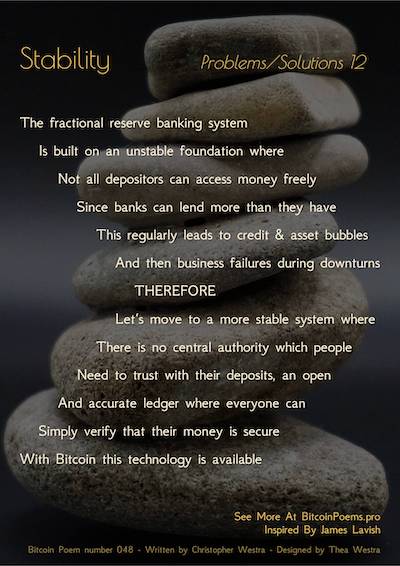
In the larger set of Bitcoin Poems, this Problem 12 Poem (Stability) is Bitcoin Poem 048 – and was inspired by James Lavish.
The fractional reserve banking system
Is built on an unstable foundation where
Not all depositors can access money freely.
Since banks can lend more than they have
This regularly leads to credit & asset bubbles
And then business failures during downturns
Therefore
Let’s move to a more stable system where
There is no central authority which people
Need to trust with their deposits, an open
And accurate ledger where everyone can
Simply verify that their money is secure
With Bitcoin this technology is available
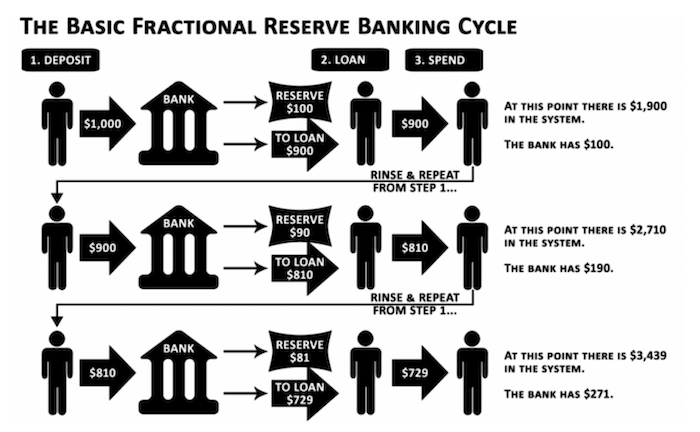
Image taken from the Research Gate website
In the fractional reserve system, banks are allowed to lend out more money than they actually hold in reserves, leading to a situation where not all depositors can access their funds simultaneously. This inherent instability can result in credit and asset bubbles, as well as systemic failures during economic downturns, as witnessed in various financial crises throughout history.
Moving towards a system of full reserve banking, where banks are required to hold 100% of their deposits in reserve, offers a solution to this instability. By ensuring that all depositors have immediate access to their funds, the risk of bank runs and financial panics is greatly reduced.
This stability is further reinforced by the adoption of a hard money standard, such as Bitcoin, where the money supply is fixed and not subject to manipulation by central authorities.
Bitcoin's decentralized and transparent ledger provides security and integrity of financial transactions without the need for a central authority. Every transaction on the Bitcoin network is recorded on the blockchain and verified by a network of decentralized nodes, making it virtually impossible to manipulate or counterfeit.
By leveraging the technology underlying Bitcoin, individuals can have confidence that their money is secure and accessible at all times. The open and accurate ledger allows for anyone to verify the integrity of their transactions, eliminating the need to trust a central authority with their deposits. This increased transparency and security pave the way for a more stable financial system, free from the boom-and-bust cycles that plague traditional fractional reserve banking.
In conclusion, transitioning to a system of full reserve banking coupled with a hard money standard like Bitcoin offers the potential for greater stability and security in the financial system. By eliminating the risks associated with fractional reserve banking and central authority control, individuals can have greater confidence in the safety and accessibility of their money, leading to a more resilient and sustainable economy.
Here is a story to illustrate:
From Opaque to Open: How Honeycomb Creek Found Security in Transparency

In the bustling town of Honeycomb Creek, life revolved around the sweet, golden honey produced by its hard working bees. Every bee diligently collected nectar, depositing their honey in the town's grand Honey Bank, a towering structure managed by Mr. Buzzworthy, a portly bee known for his booming voice and even larger promises.
Mr. Buzzworthy ran the Honey Bank on a system he called “fractional honey reserves.” He explained to the bees that while they deposited their honey, he could safely lend out a portion to others, like the industrious ants who needed honey to fuel their construction projects. This, he claimed, allowed the town to grow even richer.
At first, everything seemed fine. The bees happily deposited their honey, and the ants buzzed with activity as their projects flourished. But whispers began to spread as the bees noticed something peculiar. When a small group of bees needed some honey for the upcoming winter, Mr. Buzzworthy seemed hesitant. “There's been a temporary shortage,” he mumbled, “but don't worry, your honey is safe!”
Unease settled over Honeycomb Creek. More and more bees found it difficult to access their honey when they needed it most. Frustration grew, and rumors swirled that Mr. Buzzworthy's “temporary shortages” were more frequent than he let on.
One day, a young, tech-savvy bee named Beatrice stumbled upon an intriguing idea buzzing around the web. It was called a “honeycomb ledger,” a digital record of every honey deposit and withdrawal, completely transparent and accessible to everyone. Beatrice excitedly presented this concept to the town council.
The council, weary of Mr. Buzzworthy's opaque system, saw great promise in the honeycomb ledger. With this technology, every bee could verify their own honey reserves, eliminating the need to trust Mr. Buzzworthy entirely. Additionally, the ledger's fixed supply, mirroring the limited honey production, would prevent the inflation that had plagued the town under the fractional reserve system.
The townspeople embraced the new system. They built a secure digital network maintained by a swarm of volunteer bees, ensuring the ledger's integrity. Now, every bee could see exactly how much honey was in the collective pot, and which specific pieces of honey, or honeycrisps, were their own, fostering trust and transparency.
Honeycomb Creek thrived under the new system. The bees worked hard, knowing their honey was safe and accessible. The ants continued their construction projects, confident in a stable honey supply. The town, once riddled with anxieties about “missing honeycrisps,” buzzed with a newfound sense of security and economic harmony.
The story of Honeycomb Creek became a beacon for other towns struggling with unreliable financial systems. It demonstrated the power of a transparent and secure ledger, free from the pitfalls of fractional reserves and centralized control.
And so, the bees of Honeycomb Creek, through their innovative spirit and a little bit of digital magic, paved the way for a more stable and prosperous future.
Problems and Solutions 13 - Seigniorage
You can see this full size poem on a background here.
Here is a small version.
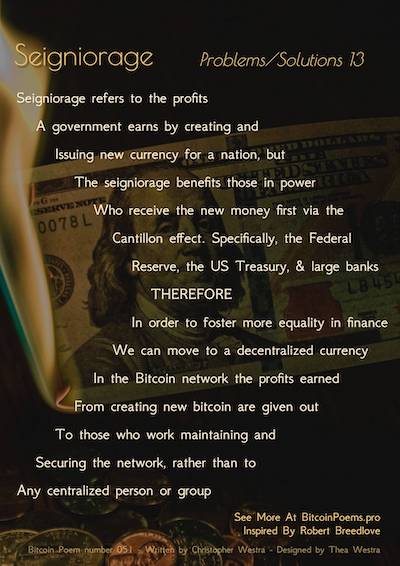
In the larger set of Bitcoin Poems, this Problem 13 Poem (Seigniorage) is Bitcoin Poem 051 – and was inspired by Robert Breedlove.
Seigniorage refers to the profits
A government earns by creating and
Issuing new currency for a nation, but
The seigniorage benefits those in power
Who receive the new money first via the
Cantillon effect. Specifically, the Federal
Reserve, the US Treasury, & large banks
Therefore
In order to foster more equality in finance
We can move to a decentralized currency
In the Bitcoin network the profits earned
From creating new bitcoin are given out
To those who work maintaining and
Securing the network, rather than to
Any centralized person or group
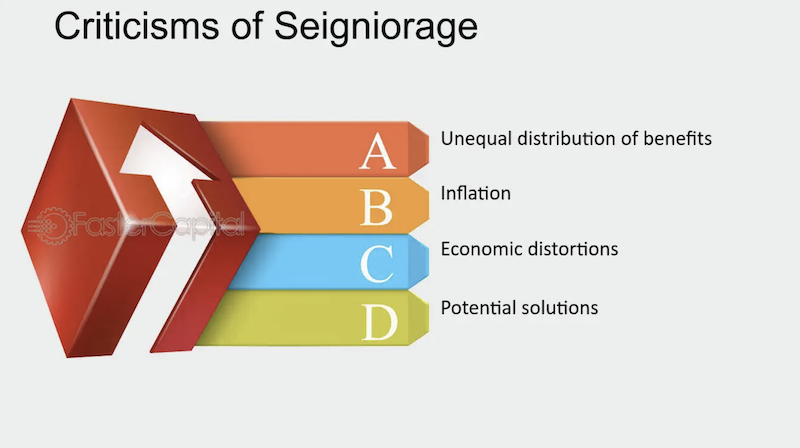
Image is from the Faster Capital Website
The Faster Capital Website has an amazing step by step article on seigniorage, and you can learn a lot by reading it. You can learn the WHY and HOW of seigniorage, the role of Central banks, and all the drawbacks. You can read this Faster Capital Article Here.
Bitcoin has the potential to promote equity in finance by eliminating the concept of seigniorage. Seignorage refers to the profits generated by a government through the creation and issuance of new currency.
In traditional monetary systems, seigniorage benefits those in positions of power, such as central banks, treasuries, and large financial institutions, who receive the newly created money first through the Cantillon effect.
This unequal distribution of seigniorage exacerbates economic inequality by disproportionately enriching those already in privileged positions.
However, with Bitcoin's decentralized nature, seigniorage is fundamentally altered. Instead of benefiting a select few, the profits earned from creating new bitcoins are distributed to individuals who contribute to the maintenance and security of the network. This process, known as mining, involves using computational power to validate and record transactions on the blockchain.
By rewarding miners with newly created bitcoins, rather than centralizing profits in the hands of a privileged few, Bitcoin fosters a more equitable distribution of wealth within the financial ecosystem.
Bitcoin's model of distributing seigniorage rewards to network participants democratizes the process of wealth creation in finance. By removing the reliance on centralized authorities and empowering individuals to participate in the network, Bitcoin promotes a more inclusive and fair financial system where wealth is generated through merit and contribution rather than inherited privilege or access to power.
This shift towards decentralization has the potential to reduce systemic inequalities and promote greater economic empowerment for individuals across the globe.
Here is a short parable to illustrate:
The Shards of Hope: A Kingdom's Journey from Inflation to Equity

In the heart of a vast kingdom, a life-giving river snaked its way through fertile fields and bustling towns. The river was the lifeblood of the land, its waters carefully managed by a council of wise Riverkeepers. These benevolent rulers ensured fair distribution of the water, nurturing a society where prosperity was shared by all.
One day, a cunning advisor named Viscount Venal approached the Riverkeepers. “Why rely solely on the river's flow?” he whispered. “We can create more wealth by printing new golden seeds, representing the river's future bounty.”
Intrigued, the Riverkeepers agreed. Viscount Venal, with a sly grin, flooded the land with these golden seeds. Merchants received them first, using them to buy more goods and inflate prices. The wealthy elite, close to the source of the new seeds, grew richer.
But as the golden seeds trickled down to the commoners, their value dwindled. Farmers struggled to buy basic necessities, and whispers of discontent filled the air. The Riverkeepers, realizing their mistake, saw the rich growing richer while the poor grew poorer.
A young boy named Kiran, known for his curiosity, discovered a hidden valley nestled within the kingdom. There, a community thrived using a unique system. Their wealth wasn't based on printed promises, but on “River Shards” – rare, beautiful stones mined from the riverbed.
Kiran learned that anyone could participate in mining these River Shards. All they needed was hard work and ingenuity to solve the complex puzzles that secured the network. Rewards for successful mining came in the form of newly discovered River Shards, fairly distributed to those who contributed to the river's health.
Returning to the kingdom, Kiran shared his discovery. The Riverkeepers, impressed by the fairness and sustainability of the River Shard system, saw a path to correcting their mistake. They embraced the new system, dismantling the printing of golden seeds.
The kingdom witnessed a transformation. As people participated in mining River Shards, wealth became more evenly distributed. Farmers used earned Shards to improve their lands, merchants offered fair prices, and a sense of shared prosperity returned.
The story of the Riverkeepers and the River Shards became a beacon of hope. It showed that true wealth wasn't created through manipulation and privilege, but through hard work, collaboration, and a system that rewarded everyone who contributed to the collective good.
The kingdom flourished, a testament to the power of a fair and decentralized system where everyone could benefit from the river's bounty.
Problems and Solutions 14 - Surety
You can see this full size poem on a background here.
Here is a small version.
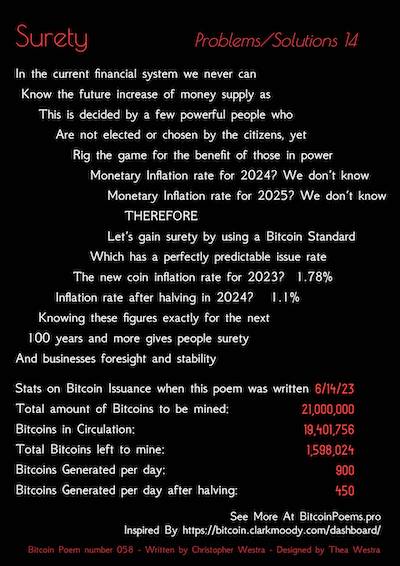
In the larger set of Bitcoin Poems, this Problem 14 Poem (Surety) is Bitcoin Poem 058 – and was inspired by Clark Moody’s Bitcoin Dashboard.
In the current financial system we never can
Know the future increase of money supply as
This is decided by a few powerful people who
Are not elected or chosen by the citizens, yet
Rig the game for the benefit of those in power
Monetary Inflation rate for 2024? We don’t know
Monetary Inflation rate for 2025? We don’t know
Therefore
Let’s gain surety by using a Bitcoin Standard
Which has a perfectly predictable issue rate
The new coin inflation rate for 2023? 1.78%
Inflation rate after halving in 2024? 1.1%
Knowing these figures exactly for the next
100 years and more gives people surety
And businesses foresight and stability
Here's a chart showing the predictable issuance of new bitcoin over the years.
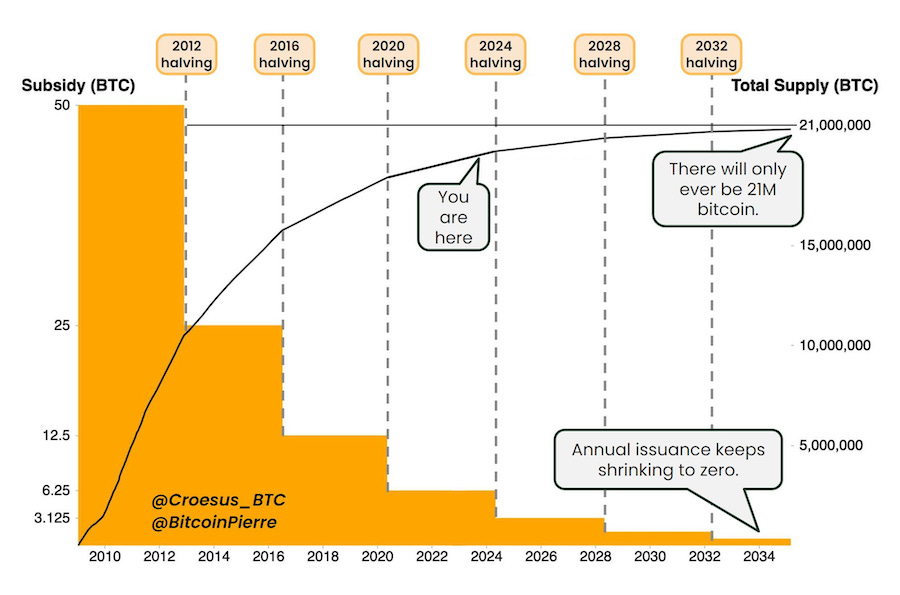
The chart above is from the Once in a Species Website
Bitcoin's predictable supply is a big advantage because it gives people more certainty for planning their lives. Unlike traditional money, where a few people decide how much money gets made, Bitcoin works differently. With Bitcoin, the amount of new coins created is set by an algorithm that everyone can see. No one person or group can change this to benefit themselves.
In our current money system, decisions about how much new money to make are made by officials who are not elected, and their choices can be influenced by their own interests. This lack of transparency and control can make people feel unsure and distrustful.
But with Bitcoin, things are clear. The rate at which new Bitcoins are created is known in advance and is open for everyone to see. This means that people and businesses can plan for the future with confidence, knowing exactly how much new Bitcoin will be made each year.
For example, Bitcoin's inflation rate is calculated and made public, so people can see how much new Bitcoin will be created in the future. This transparency helps people make smart decisions about their money.
By removing the uncertainty around how much new money will be created, Bitcoin helps create a stable and strong financial system that benefits everyone.
Here is a story to illustrate:
From Shifting Sands to Solid Ground: How a Village Tamed Inflation

In the bustling village of Shifting Sands, life revolved around a peculiar form of currency – seashells. These weren't ordinary seashells, but “Everlasting Shells,” magically imbued with value by the enigmatic Shell Council.
The Shell Council, shrouded in secrecy, controlled the flow of these shells into the village. No one knew how many shells existed, nor how many were added each year. Whispers filled the air, with some fearing the Council might create a flood of shells, eroding their value, while others worried about a crippling scarcity.
This uncertainty plagued the villagers. Farmers couldn't plan for future harvests, hesitant to invest in seeds if the shells they earned might lose their buying power overnight. Shopkeepers worried about stocking their shelves, unsure whether shells would buy their goods tomorrow. A constant sense of unease hung over the village.
One day, a young fisherman named Kai returned from a distant voyage, his eyes wide with wonder. He spoke of a new land, a land of “Fixed Shells.” In this land, everyone knew exactly how many shells existed and how many new ones would be added each year. This knowledge, Kai explained, brought stability and prosperity to the land.
Intrigued, the villagers gathered to hear more.
Kai described a system where the creation of new shells followed a transparent and predictable schedule, visible to everyone. This certainty, he explained, allowed people to plan for the future without fear of a sudden change in the value of their shells.
The villagers, yearning for stability, decided to adopt this “Fixed Shell” system. They devised a plan where beautiful, intricately carved shells, mined from a nearby reef, would be used as currency. The villagers determined a fixed number of these shells to be mined each year, creating a predictable and transparent system.
The change was transformative. Farmers invested in better tools, knowing the value of their crops wouldn't be eroded by inflation. Shopkeepers confidently stocked their shelves, assured that their wares would retain their value. A sense of security and hope blossomed in the village.
The story of the Village of Shifting Sands became a beacon of hope for others struggling with unpredictable currencies. It showed the power of a transparent and predictable monetary system, where everyone knew the rules and could plan for a brighter future.
The village, once plagued by uncertainty, thrived under the stability and security of their “Fixed Shell” system, a testament to the value of knowing your money will hold its worth, allowing you to build a life with confidence.
Problems and Solutions 15 - Portability
You can see this full size poem on a background here.
Here is a small version.
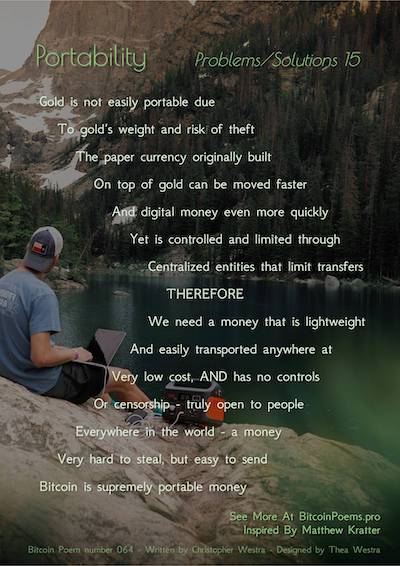
In the larger set of Bitcoin Poems, this Problem 15 Poem (Portability) is Bitcoin Poem 064 – and was inspired by Matthew Kratter's Bitcoin University.
Gold is not easily portable due
To gold’s weight and risk of theft
The paper currency originally built
On top of gold can be moved faster
And digital money even more quickly
Yet is controlled and limited through
Centralized entities that limit transfers
Therefore
We need a money that is lightweight
And easily transported anywhere at
Very low cost, AND has no controls
Or censorship - truly open to people
Everywhere in the world - a money
Very hard to steal, but easy to send
Bitcoin is supremely portable money
The italicized paragraphs below are taken from Fidelity’s report “Bitcoin First Revisited”, Published September 2023. You can read or download the entire excellent report right here.
"Why We Believe Bitcoin is Best Understood as a Monetary Good
What is money? We believe money is a tool that allows exchange rather than barter. Throughout most of history, we have seen humans iterate in search of the “best” representation of money. A monetary good is a good that is valued for its tradability for other goods, not its consumption or use.
Throughout history, various goods have been used as money, such as shells, beads, stones, fur, and wampum. This leads to the question: why do some things become treated as a monetary good, while others do not?
Economists and historians suggest that the answer lies in several characteristics that make “good money.” The more characteristics a good possesses, the better it can serve as being money or the more likely it will emerge or be accepted as money.
Bitcoin clearly possesses a lot of good qualities of money, combining the scarcity and durability of gold with the ease of use, storage, and transportability of fiat (even improving on it).
It is also worth noting that, just like other monetary goods, bitcoin is not a company, it does not pay a dividend, nor does it have cash flows. Therefore, its value must be derived from its ability to better fulfill the characteristics of a monetary good compared to traditional alternatives.”
The chart below is also from the Fidelity report, and provides a summary score of Bitcoin, Gold, and Fiat in terms of the qualities of money, including portability.
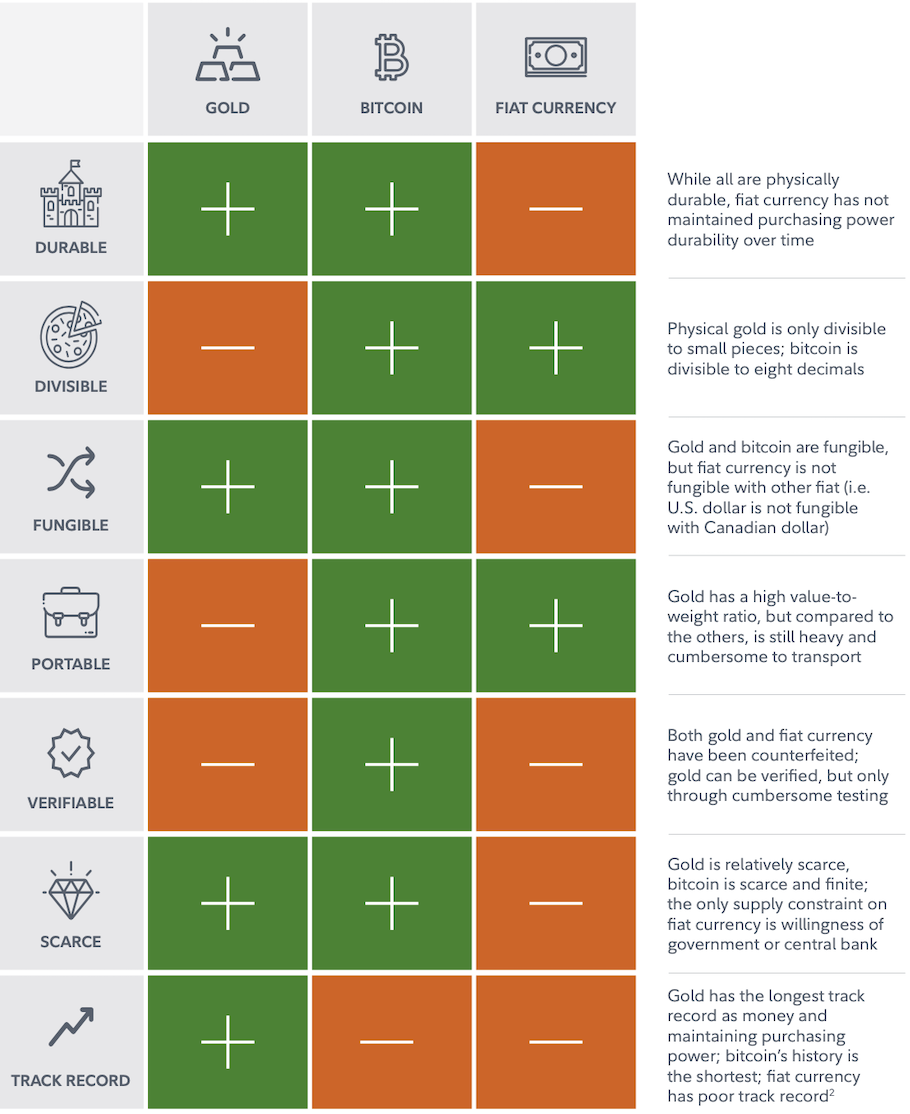
Bitcoin is both lightweight and easily transferable, while also being resistant to censorship and control. Unlike physical assets like gold, which are cumbersome to transport due to their weight and susceptibility to theft, Bitcoin exists purely in digital form, allowing for seamless and instantaneous transactions across borders and continents.
This inherent portability makes Bitcoin an ideal medium of exchange for a globalized world where individuals and businesses need to move money quickly and efficiently.
Bitcoin's decentralized nature ensures that transactions cannot be censored or controlled by any single authority or institution. Traditional forms of digital money, such as bank transfers or electronic payments, are subject to the whims of centralized entities that can impose restrictions or fees on transactions.
In contrast, Bitcoin operates on a peer-to-peer network, where transactions are validated and recorded by a distributed network of nodes, eliminating the need for intermediaries and ensuring that transfers cannot be arbitrarily blocked.
This unparalleled combination of portability, security, and freedom from censorship makes Bitcoin uniquely suited for facilitating global commerce and financial inclusion. Whether sending remittances to family members in another country, conducting cross-border trade, or simply transferring funds between individuals, Bitcoin offers a borderless and censorship-resistant alternative to traditional forms of money.
By empowering individuals with greater control over their finances and removing barriers to financial access, Bitcoin’s portability and speed are already fostering economic empowerment and prosperity in areas where adoption is high.
Here is a story to illustrate:
The Weight of Gold vs. the Speed of Light: A Marketplace Transformed by Portable Money
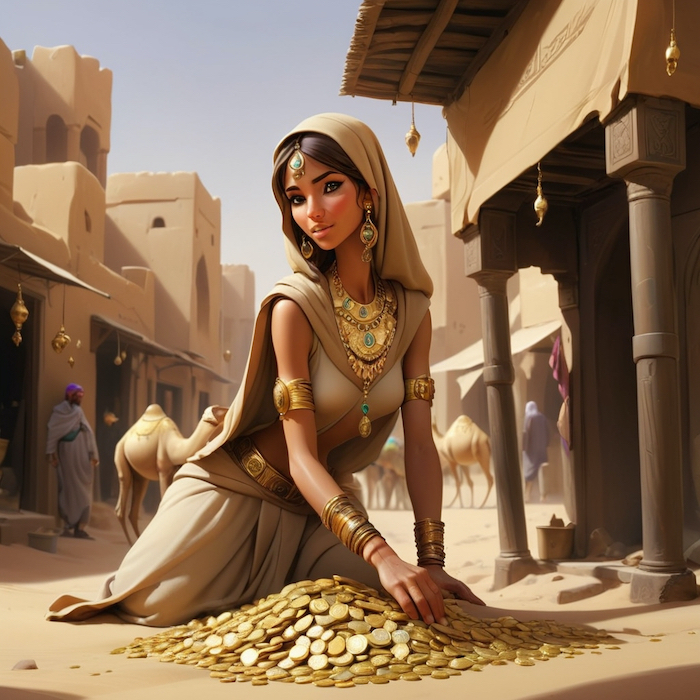
In the bustling marketplace of Oasis, camels laden with gold lumbered through the dusty streets. Merchants used these precious coins to buy and sell exotic wares, but there were drawbacks. The gold's weight slowed down caravans, making them easy targets for desert bandits.
One day, a clever trader named Aisha arrived, her camel carrying not gold, but strange scrolls filled with cryptic symbols. These scrolls, she explained, represented a new form of money – “Sunstones.”
Sunstones, Aisha explained, existed not in physical form, but on a vast network accessible to anyone with a special device. They were lighter than a feather, and a single scroll could hold a fortune. Amazed, the merchants gathered around, listening as Aisha described the speed and security of Sunstones. Unlike gold, they could be sent across vast distances in an instant, with no risk of theft.
However, a shadow fell over the marketplace as the portly Governor strutted in. He declared Sunstones illegal, claiming they threatened his control over the flow of money. The merchants grumbled, frustrated by the Governor's attempt to hold power through censorship.
Aisha, however, remained calm. “Sunstones,” she declared, “cannot be controlled by any single ruler. They exist on a network beyond anyone's reach.” The Governor fumed, but Aisha was right. Transactions using Sunstones were validated by a vast community, making them impossible for him to manipulate.
News of Sunstones spread like wildfire. Soon, merchants across the land embraced them. Caravans moved faster, unburdened by heavy gold. People far and wide, even those outside the Governor's reach, could now participate in the Oasis marketplace.
Sunstones, lightweight, secure, and free from censorship, became the lifeblood of trade.
As the marketplace flourished, the Governor's power dwindled. The people, empowered by the freedom of Sunstones, built a more inclusive and prosperous Oasis.
The story of Sunstones became a beacon of hope, showing the power of a borderless and censorship-resistant form of money, where everyone, from grand merchants to nomadic herders, could participate in the global economy.
Problems and Solutions 16 - Fallibility
You can see this full size poem on a background here.
Here is a small version.
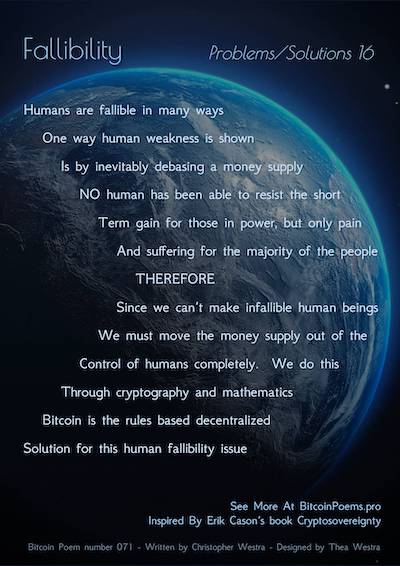
Bitcoin Poem 071 – Written 10/17/23
Fallibility (Problems/Solutions 16)
Inspired by: Erik Cason’s book Cryptosovereignty
Humans are fallible in many ways
One way human weakness is shown
Is by inevitably debasing a money supply
NO human has been able to resist the short
Term gain for those in power, but only pain
And suffering for the majority of the people
Therefore
Since we can’t make infallible human beings
We must move the money supply out of the
Control of humans completely. We do this
Through cryptography and mathematics
Bitcoin is the rules based decentralized
Solution for this human fallibility issue
Bitcoin is a type of “Ulysses Contract” or “Ulysses Pact”.
In ancient Greek mythology, the story of Ulysses and the sirens serves as a cautionary tale about the fallibility of human nature. See the full story down below.
This concept of pre-commitment, known as a Ulysses contract, underscores the recognition of human fallibility and the need to establish rules ahead of time to mitigate its effects. Similarly, in the realm of finance, humans have repeatedly demonstrated their susceptibility to short-term gains at the expense of long-term stability.
History is full of examples of monetary debasement, where those in power manipulate the money supply for their own benefit, leading to economic instability and hardship for the masses.
Recognizing the inherent weaknesses of human nature, the solution lies in removing control from human hands entirely. Bitcoin uses rules within cryptography and mathematics. Bitcoin operates on a trustless system, where transactions are verified and recorded by a network of computers, eliminating the need for intermediaries or central authorities susceptible to human frailties.
By anchoring the money supply to immutable rules enforced by code, Bitcoin transcends the fallibility of human judgment. It operates according to predetermined principles, immune to the whims of individuals or institutions.
Just as Ulysses bound himself to the mast to resist the sirens' call, Bitcoin binds the financial system to the unyielding principles of mathematics, ensuring integrity and stability in the face of human fallibility.
Bitcoin represents the Ulysses contract for the digital age, a testament to humanity's recognition of its own limitations and the ingenuity to devise systems that transcend them. By embracing the power of cryptography and mathematics, Bitcoin offers a beacon of hope in a world fraught with uncertainty, providing a rules-based solution to the perennial problem of human fallibility in matters of finance.
This not only removes the potential for abuse and manipulation but also fosters trust and confidence in the integrity of the monetary system.
Here is a story to illustrate:
Beyond the Siren's Song: Bitcoin and the Fight Against Monetary Manipulation
The image of Ulysses below is a scene from the ancient Greek epic “The Odyssey”. This painting is by John William Waterhouse.

In the ancient land of Greece, there lived a wise and cunning king named Ulysses. Throughout his many adventures, Ulysses encountered countless challenges, but none were as perilous as the temptation of the sirens.
These mythical creatures, with their enchanting songs, lured sailors to their doom upon the rocky shores. Ulysses, knowing the danger that lay ahead, devised a plan to protect himself and his crew from the sirens' irresistible call.
As his ship approached the sirens' island, Ulysses ordered his men to plug their ears with wax, ensuring they would not succumb to the sirens' song. But Ulysses knew his own weakness, and he feared he might be unable to resist the sirens' allure.
So, he devised a cunning strategy. He instructed his men to bind him tightly to the mast of the ship and to ignore his pleas for release, no matter how fervently he begged. With this plan in place, Ulysses sailed onward, determined to overcome the sirens' temptation.
As the ship drew near to the sirens' island, the haunting melody of their song filled the air. Ulysses, unable to resist the pull, cried out to his men, begging them to set him free. But his loyal crew, following his earlier orders, remained steadfast, ignoring his pleas and sailing safely past the danger.
In the end, Ulysses and his crew emerged unscathed, having overcome the sirens' temptation through their pre-determined plan of action. Their journey served as a testament to the power of foresight and self-restraint in the face of temptation.
Similarly, in the realm of finance, humans are fallible and prone to succumb to the temptation of short-term gain. Throughout history, monetary systems have been debased by those in power, leading to economic instability and hardship for the masses.
Recognizing this inherent weakness, Bitcoin offers a solution rooted in cryptography and mathematics. By removing control from human hands and anchoring the money supply to immutable rules enforced by code, Bitcoin transcends the fallibility of human judgment.
Just as Ulysses bound himself to the mast to resist the sirens' call, Bitcoin binds the financial system to the unyielding principles of mathematics, ensuring integrity and stability in the face of human fallibility. Through its decentralized and rules-based approach, Bitcoin offers a path towards a more resilient and trustworthy monetary system, free from the whims of individuals or institutions.
Problems and Solutions 17 - Home Affordability
You can see this full size poem on a background here.
Here is a small version.
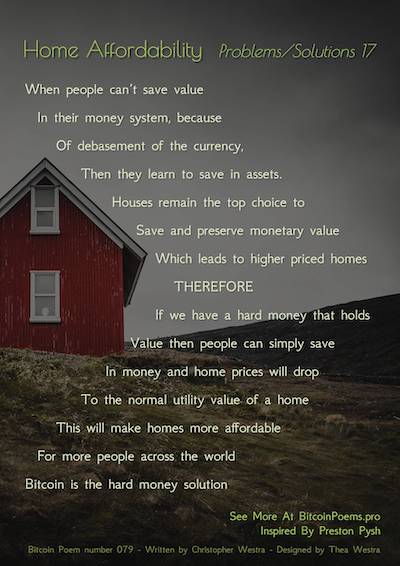
Bitcoin Poem 079 – Written 12/19/23
Home Affordability (Problems/Solutions 17)
Inspired by: Preston Pysh
When people can’t save value
In their money system, because
Of debasement of the currency,
Then they learn to save in assets.
Houses remain the top choice to
Save and preserve monetary value
Which leads to higher priced homes
Therefore
If we have a hard money that holds
Value then people can simply save
In money and home prices will drop
To the normal utility value of a home
This will make homes more affordable
For more people across the world
Bitcoin is the hard money solution

The chart above is from Statista (Source: St. Louis Fed)
You can see from the chart that home prices continue to go up, while supply of homes is going down.
When people can't save value in their money system because the currency loses value due to debasement, they tend to look for other ways to store their wealth. One popular choice has been houses. People buy houses not just to live in, but also to preserve the value of their money. This demand for houses as an investment leads to higher prices, making homes less affordable for many.
This is a huge problem.
However, if we have a hard money system, like Bitcoin, that holds its value over time, people wouldn't need to rely on houses as much to preserve their wealth. Instead of investing in houses, they could simply save their money in Bitcoin, knowing that its value will hold steady. This would reduce the demand for houses as investments, leading to more reasonable prices based on the actual utility of the home.
With lower housing prices, more people around the world would be able to afford homes. This shift away from using houses as stores of value or investments towards a reliable hard money system like Bitcoin could make the dream of owning a home a reality for many who are currently priced out of the market.
This may be starting to happen already.
One indicator is the increasing adoption and acceptance of Bitcoin as an investment vehicle. Over the years, Bitcoin has gained mainstream recognition and acceptance as a legitimate store of value, with more institutional investors, corporations, and individuals allocating portions of their portfolios to Bitcoin. This suggests that some people may be choosing to invest in Bitcoin as a hedge against currency devaluation or economic uncertainty, rather than solely relying on traditional assets like real estate.
Additionally, there have been instances where individuals or organizations have publicly disclosed their decision to invest in Bitcoin instead of real estate. These anecdotes, while not representative of broader trends, provide some insight into the mindset of certain investors who see Bitcoin as a viable alternative for preserving wealth.
A Fortress Against Inflation: The Star Anchor and the Dream of Home Ownership

In the bustling port city of Anchoria, the once-trusted coral coins were a constant source of worry. Every few months, the greedy Governor, Lord Barnacle, would “discover” a new, larger coral reef, flooding the market with freshly minted coins. Predictably, the value of coral plummeted.
Folks in Anchoria scrambled to save their wealth. The blacksmith, unable to trust the coral, hoarded all his extra iron in his forge, driving the price up for everyone. The sailmaker, fearing worthless coral, bought every spare bolt of cloth he could find, making them scarce and expensive.
The worst hit? Homes. People, desperate to hold onto value, poured their coral into houses, bidding them up far beyond their actual worth. A simple fisherman's shack became a mansion of empty rooms, unaffordable for any young couple starting out.
A wise old sailor named Captain Rowen saw the chaos. “We need something sturdy, mateys,” he declared, “something that won't dissolve like coral in a storm!”
Captain Rowen had heard rumors from visiting traders about a faraway land where people used “Star Anchors” – a digital form of money, unchangeable and limited in quantity. These Star Anchors, secured by a vast network of ships, held their value year after year.
Intrigued, the villagers learned more. They discovered a system where complex puzzles controlled the creation of new Star Anchors, ensuring a steady flow. Unlike coral, Star Anchors offered stability.
With newfound confidence, Anchoria embraced the Star Anchor system. Blacksmiths could focus on crafting, sail makers on sewing, and most importantly, houses were valued for what they were – homes, not investments. Prices dropped, making them accessible for families and young couples.
Anchoria flourished. People saved their Star Anchors, knowing their value wouldn't disappear overnight. The city, once plagued by the ever-degrading coral, became a beacon of stability, all thanks to a hard money solution: the Star Anchor.
The story of Anchoria spread far and wide, offering hope to those trapped in similar situations. Star Anchors, a symbol of reliability, paved the way for a future where homes were valued for their purpose, not a desperate attempt to hold onto wealth.
Problems and Solutions 18 - Savings
You can see this full size poem on a background here.
Here is a small version.
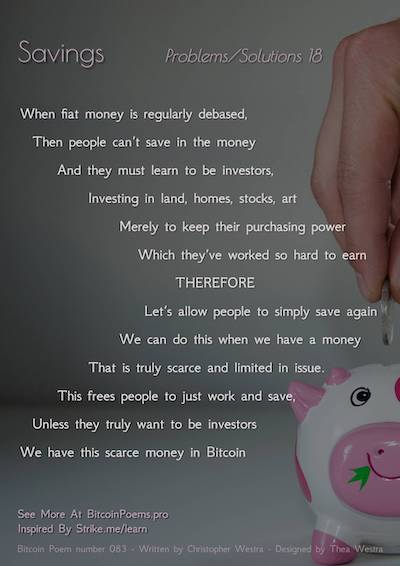
Bitcoin Poem 083 – Written 1/17/24
Savings (Problems/Solutions 018)
Inspired by: Strike.me/learn
When fiat money is regularly debased,
Then people can’t save in the money
And they must learn to be investors,
Investing in land, homes, stocks, art
Merely to keep their purchasing power
Which they’ve worked so hard to earn
Therefore
Let’s allow people to simply save again
We can do this when we have a money
That is truly scarce and limited in issue.
This frees people to just work and save,
Unless they truly want to be investors
We have this scarce money in Bitcoin
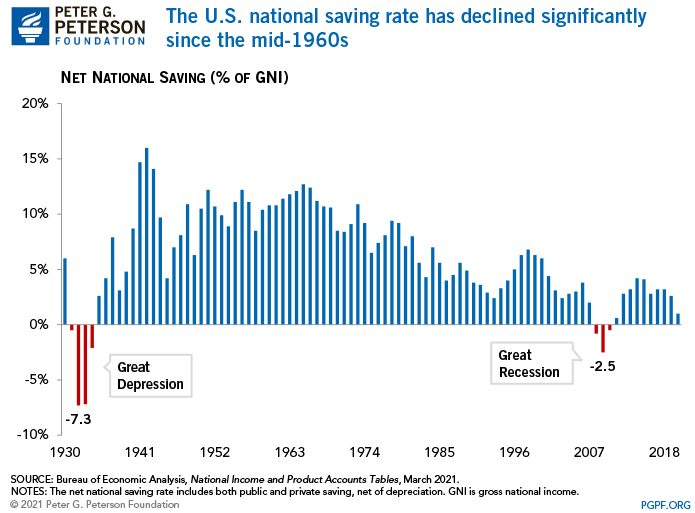
The image above is from the Peter G. Peterson Foundation Website
When regular money loses its value over time due to things like inflation or government actions, it becomes hard for people to save using that money. Instead, they're pushed into investing their money in things like land, houses, stocks, or art. They do this not because they want to, but because they're trying to keep the value of their hard-earned money from disappearing.
Imagine you work really hard to earn some money, but every year that money buys you less and less because prices keep going up. It's like trying to fill a bucket with water, but there's a hole in the bottom leaking out drops every second. You have to keep adding more water to make sure it doesn't run out.
But what if we had a different kind of money, one that doesn't lose its value over time? That's where Bitcoin comes in. Bitcoin is designed to be scarce and limited in how much can be created.
This means its value doesn't erode away like regular money does.
With Bitcoin, people can go back to the simple idea of saving money without worrying about it losing its value. They can work hard, earn some Bitcoin, and then just keep it safe without feeling pressured to constantly invest it in other things just to protect its worth.
Of course, if people want to invest, they still can. But with Bitcoin, it's more of a choice rather than a necessity. So, Bitcoin gives people the freedom to focus on their work and saving, without always feeling like they have to play the investment game just to keep up.
Here is a little story about Dr. Smith, who had to become an investor to try and keep up with the debasement of his money.
Bitcoin to the Rescue: A Story of a Dentist Who Outwitted Inflation

Once upon a time in a quaint town, there was a dentist named Dr. Smith. Dr. Smith loved nothing more than brightening people's smiles with his dental skills. His days were filled with fixing cavities, straightening crooked teeth, and soothing nervous patients with his gentle demeanor.
But one day, Dr. Smith noticed something troubling. Despite his hard work and dedication, the money he earned seemed to slip through his fingers like grains of sand. Every year, prices seemed to creep up, making it harder and harder to save for the future. It was like trying to fill a leaky bucket with water – no matter how much he poured in, it always seemed to drain away.
Concerned about his financial future, Dr. Smith decided to take matters into his own hands. He knew he needed to learn more about investing if he wanted to secure his hard-earned money against the erosion of inflation. So, in between appointments and late into the night, Dr. Smith delved into books and online resources, soaking up knowledge about stocks, real estate, and other investment opportunities.
As Dr. Smith juggled his dental practice with his newfound interest in investing, he couldn't help but feel overwhelmed at times. But then he heard about Bitcoin – a revolutionary form of money that didn't lose its value over time like regular currency did. Intrigued by this concept, Dr. Smith dove deeper into learning about Bitcoin and its potential as a store of value.
With Bitcoin, Dr. Smith realized, he could simplify his financial strategy. He could focus on his passion for dentistry without constantly worrying about the value of his hard-earned money evaporating. Instead of feeling pressured to constantly invest in uncertain ventures to protect his wealth, he could simply save his earnings in Bitcoin and watch them retain their value over time.
As Dr. Smith embraced Bitcoin, he felt a newfound sense of security and freedom. No longer shackled by the fear of inflation, he could focus on what he loved most – brightening smiles and spreading happiness in his community. And so, with a smile on his face and Bitcoin in his wallet, Dr. Smith continued his journey, confident in the knowledge that his financial future was in safe hands.
Problems and Solutions 19 - Neutrality
You can see this full size poem on a background here.
Here is a small version.
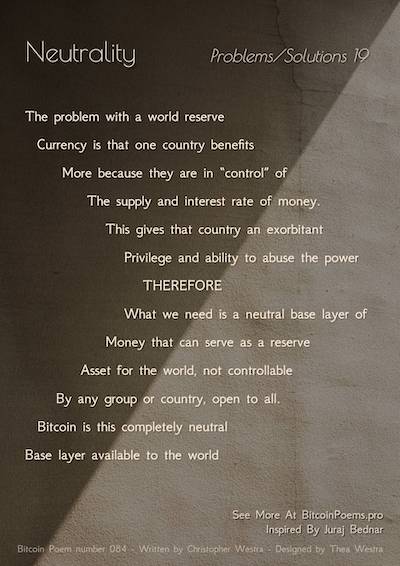
Bitcoin Poem 084 – Written 1/24/24
Neutrality (Problems/Solutions 019)
Inspired by: Juraj Bednar
The problem with a world reserve
Currency is that one country benefits
More because they are in “control” of
The supply and interest rate of money.
This gives that country an exorbitant
Privilege and ability to abuse the power
Therefore
What we need is a neutral base layer of
Money that can serve as a reserve
Asset for the world, not controllable
By any group or country, open to all.
Bitcoin is this completely neutral
Base layer available to the world
The chart below shows the many World Reserve Currencies that have been in effect in the past centuries.8
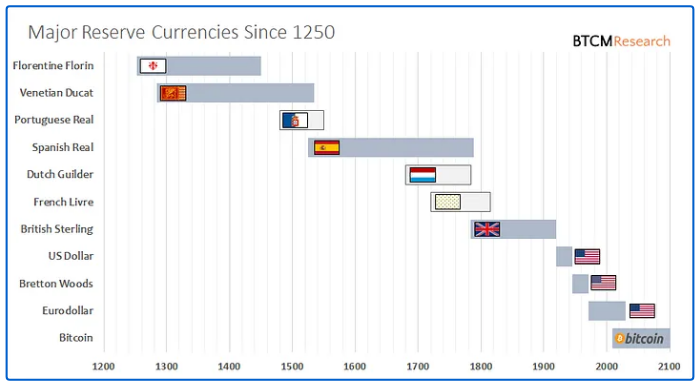
This image is from BTCM Research on Medium
The issue with having one country's currency as the world reserve is that it gives that country a lot of power. They can control how much money is made and even set the interest rates. This means they have a big advantage, and they do misuse that power.
So, what we really need is a type of money that doesn't belong to any particular country or group. It should be open to everyone and not controlled by any single entity. This way, it can serve as a fair and neutral base for the world's economy.
Bitcoin is this completely neutral layer of money that's available to everyone around the world. It's not owned or controlled by any government or organization. Instead, it operates on a decentralized network of computers, meaning no one can manipulate it for their own benefit.
Because of this neutrality, Bitcoin has the potential to become a global reserve asset that isn't subject to the whims of any one nation or power. It could provide stability and fairness in the financial system, benefiting people from all walks of life, regardless of where they live or what country they're from.
Here is a story to illustrate:
Cracks in the Golden Chest: A Story of Broken Power and the Promise of Bitcoin
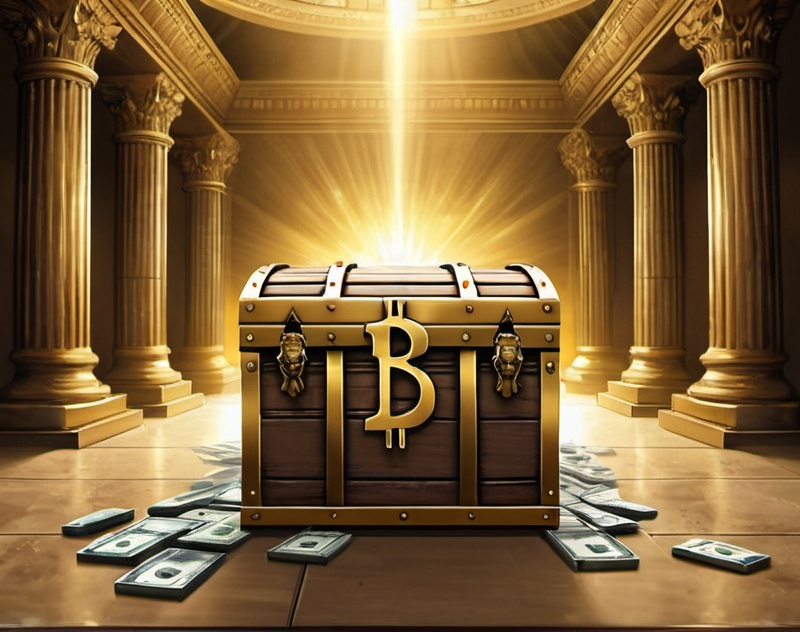
Once upon a time, in a bustling world where nations vied for power and influence, there was a grand hall where all the world's leaders gathered to discuss matters of great importance. In this hall, there was a golden chest, said to hold the key to global prosperity. Inside the chest lay the world reserve currency, a symbol of wealth and power coveted by all.
Each year, the leaders would convene to decide which country's currency would fill the chest and become the world reserve. The chosen nation would bask in the glory of its newfound status, wielding immense influence over the global economy.
For centuries, this system seemed to work. But over time, cracks began to appear. The nation with the world reserve currency grew complacent, using its power to serve its own interests rather than the greater good. Other countries felt marginalized, their voices drowned out by the roar of the dominant currency.
Realizing the flaws in the existing system, a wise sage emerged from the shadows. He spoke of a new kind of currency, one that belonged to no nation and answered to no authority. This currency, he said, would be open to all, free from manipulation and control.
The sage called this currency Bitcoin, a digital marvel built on the principles of decentralization and neutrality. Unlike the world reserve currency, Bitcoin couldn't be influenced by any single nation or group. Its value was determined by the collective agreement of its users, who entrusted their faith in its mathematical certainty.
As word of Bitcoin spread, leaders from far and wide were intrigued by its potential. They realized that with Bitcoin as the world reserve, no nation would hold undue sway over the global economy. Instead, power would be decentralized, ensuring fairness and stability for all.
And so, in the grand hall where once the world reserve currency reigned supreme, there now stood a gleaming pedestal bearing the symbol of Bitcoin. It was a symbol of hope and unity, a testament to the power of technology to transcend borders and build a more equitable world for future generations.
Problems and Solutions 20 - Big Government
You can see this full size poem on a background here.
Here is a small version.
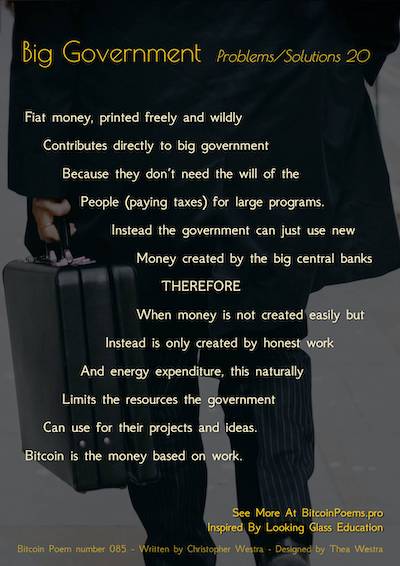
Bitcoin Poem 085 – Written 2/3/24
Big Government (Problems/Solutions 020)
Inspired by: Looking Glass Education
Fiat money, printed freely and wildly
Contributes directly to big government
Because they don’t need the will of the
People (paying taxes) for large programs.
Instead the government can just use new
Money created by the big central banks
Therefore
When money is not created easily but
Instead is only created by honest work
And energy expenditure, this naturally
Limits the resources the government
Can use for their projects and ideas.
Bitcoin is the money based on work
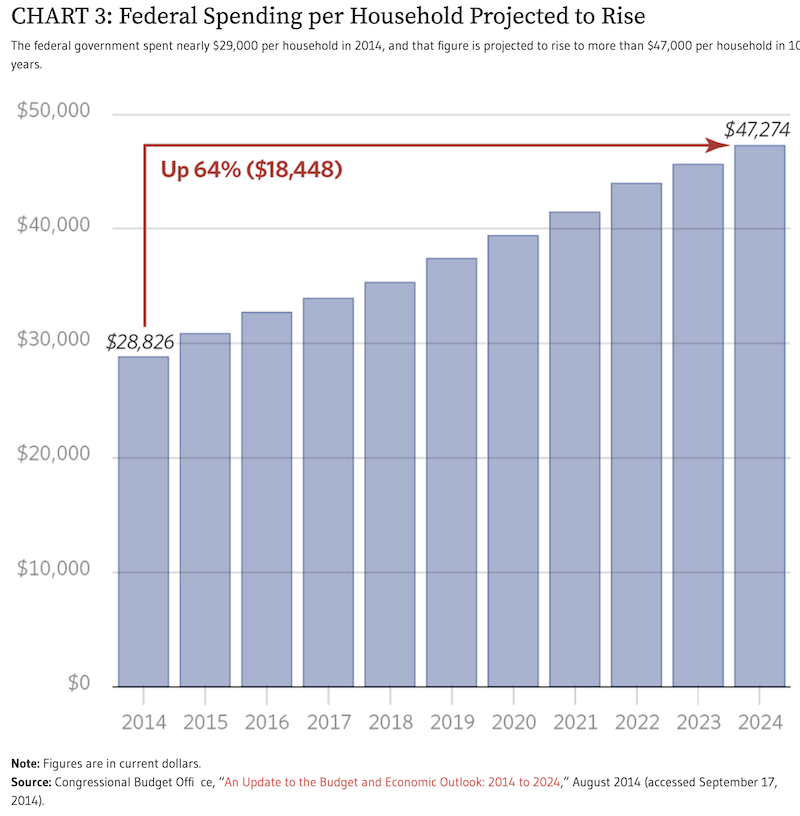
Image is from the Heritage Foundation Website
Imagine you and your friends are playing a game where you can create your own currency. Let's say you're in charge of creating coins, and you decide to make a rule: for every coin you create, you have to do a specific task, like running around the block or solving a puzzle. This means you can't just make coins whenever you feel like it; you have to put in some effort each time.
Now, think about another friend who's playing the same game but with a different rule. This friend can create as many coins as they want, whenever they want, without doing any work at all. They just snap their fingers, and new coins magically appear.
In this game, your friend's rule is like fiat money, the kind of money we use every day. Governments can print as much fiat money as they want, whenever they want, without needing the consent of the people who use it. This easy printing of money can lead to big government spending because they don't rely on the hard work of the people through taxes. Instead, they can simply create more money out of thin air.
However, your rule, where you have to do something to earn each coin, is more like Bitcoin. With Bitcoin, new coins are created through a process called mining, which requires computers to solve complex mathematical problems. This process takes time, effort, and energy. Because of this, there's a limit to how many bitcoins can be created, and it's much harder for governments to spend recklessly because they can't just create more bitcoins whenever they want.
So, when money is based on work and energy expenditure, like Bitcoin, it naturally limits the resources governments can use for their projects and ideas. This could put a check on big government spending and encourage more responsible financial decisions.
In addition to the chart above, this Heritage Foundation page has other info and charts relating to the increasing size of government.
Here is a story to illustrate:
From Pebbles to Profits: A Playground Lesson in Economics

On a sunny afternoon, a group of friends gathered in the park for their favorite game – “Barterville.” The rules were simple: they traded imaginary items using colorful pebbles as currency.
One friend, Max, was the “Banker.” He kept a small pouch of pebbles, ensuring there were just enough for everyone to play comfortably. Every trade felt fair because the pebbles held their value.
But then, a new kid named Alex joined in. Alex, full of ideas, wanted to build a giant sandcastle, but he lacked pebbles. Impatient, he declared, “I'll just make more!” He grabbed a handful of dirt and pretended to transform it into shiny pebbles.
The other kids were skeptical. “But where did those come from?” Sarah asked. Max explained, “We can't just create more pebbles. Their value comes from having just the right amount for everyone.”
Unconvinced, Alex kept creating his own “dirt-money.” Soon, there were piles of it everywhere. The initial excitement of having more faded as the “dirt-money” lost its value. Nobody wanted it anymore.
Meanwhile, Max's pebbles, representing limited resources earned through honest work, remained valuable. Sarah used hers to buy a stick for her flag, and Ben traded his for a beautiful leaf crown.
Frustrated, Alex realized his shortcut had ruined the game. He apologized and asked Max, “How can we fix this?”
Max smiled. “Let's restart with the original pebbles. Remember, the fun comes from trading what we have, not just having more.”
From then on, they played with a newfound appreciation for limited resources. The experience mirrored the real world. Governments printing too much money, like Alex with his dirt-money, could lead to inflation, where the money loses its value.
Bitcoin, however, functioned more like Max's pebbles, limited in quantity and earned through a process called mining. This limited supply prevents governments from simply creating more money to fund their projects.
As they continued playing, the friends understood that a currency based on work and limited resources, like Bitcoin, could offer a more balanced system, encouraging responsible spending and fair exchange. Just like in Barterville, true value came from honest effort, not shortcuts.
Problems and Solutions 21 - Peer to Peer
You can see this full size poem on a background here.
Here is a small version.
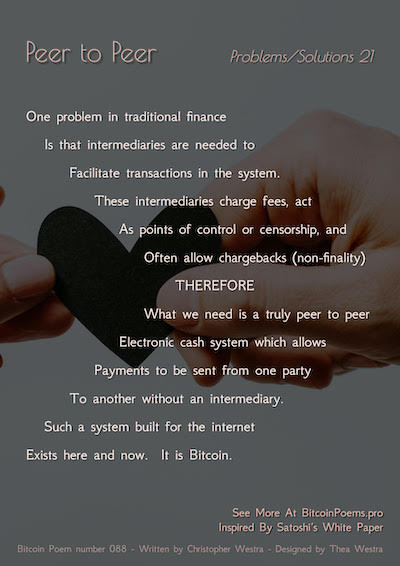
Bitcoin Poem 088 – Written 2/25/24
Peer to Peer (Problems/Solutions 021)
Inspired by: Satoshi’s White Paper
One problem in traditional finance
Is that intermediaries are needed to
Facilitate transactions in the system.
These intermediaries charge fees, act
As points of control or censorship, and
Often allow chargebacks (non-finality)
Therefore
What we need is a truly peer to peer
Electronic cash system which allows
Payments to be sent from one party
To another without an intermediary.
Such a system built for the internet
Exists here and now. It is Bitcoin.
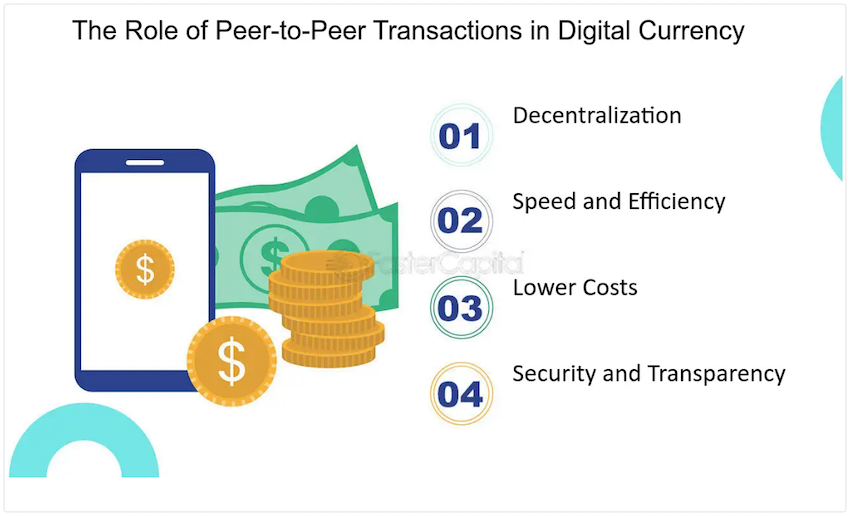
The image is from the Faster Capital Website
I happen to believe there are more benefits than drawbacks to using peer to peer payments, but to be fair, you can read about some possible drawbacks by clicking on the link above to the Faster Capital Website.
Think about when you want to send money to a friend using traditional methods like banks or payment apps. There's usually a middleman involved, like a bank or a payment service, which helps make the transfer happen. But these middlemen often charge fees for their services, and they can also control or censor transactions. Plus, sometimes they allow for chargebacks, which means a transaction can be reversed even after it's been completed.
Now, imagine a system where you can send money directly from your wallet to your friend's wallet without needing any middlemen. That's what Bitcoin does. It's like handing cash directly to your friend without anyone else getting involved. This is what we mean by peer-to-peer – you're dealing directly with the other person, no intermediaries needed.
Bitcoin works on a decentralized network, which means there's no central authority or intermediary controlling the transactions. Instead, transactions are verified and recorded by a network of computers called miners. These miners use powerful computers to solve complex mathematical problems, and in return, they're rewarded with newly created bitcoins. This process ensures the security and integrity of the Bitcoin network without the need for a central party.
One of the big benefits of this peer-to-peer system is that it reduces fees. Since there's no middleman taking a cut of each transaction, you can send money to anyone, anywhere in the world, with minimal fees. Plus, because there's no central authority controlling the transactions, there's less risk of censorship or interference.
Once a transaction is confirmed on the Bitcoin network, it's final – there's no way for it to be reversed, which provides a level of security and trust that traditional financial systems sometimes lack. So, Bitcoin not only offers a way to transfer value directly between peers but also brings greater freedom, security, and efficiency to the financial system.
Here is a story to illustrate:
The Sandglass of Trust: A Tale of Peer to Peer Innovation in the Crimson Citadel

In the bustling marketplace of Crimson Citadel, camels laden with exotic spices jostled for space with merchants hawking vibrant silks. Here, amidst the cacophony of bartering and haggling, lived two friends, Amara and Samir.
Amara, a weaver of exquisite tapestries, wished to purchase a rare jar of sapphire dust from Samir, a spice merchant. However, their options were limited. They could exchange goods directly, which was risky and inconvenient. Or, they could rely on Hakim the Moneychanger.
Hakim, a portly man with a perpetually calculating gaze, operated a money booth. He accepted goods in exchange for his special coins, which Amara and Samir could then use to purchase items. But Hakim's services weren't free. He charged a hefty fee for every exchange, and whispers swirled about his tendency to manipulate the exchange rates.
One stifling afternoon, Amara approached Samir, frustration etched on her face. “The price of sapphire dust keeps rising with Hakim taking his cut,” she lamented. “Wouldn't it be wonderful if we could trade directly, without relying on his greed?”
Samir, a tinkerer with a knack for inventions, tapped his chin thoughtfully. “There has to be a better way,” he mused. Days turned into weeks as Samir hunched over his workbench, gears whirring and metal clinking in a symphony of creation. Finally, he unveiled his invention – a marvel of brass and crystal he called the “Sandglass of Trust.”
The Sandglass, powered by intricate clockwork, allowed Amara and Samir to directly record their trades. Each transaction was etched onto a permanent record, visible to everyone. This eliminated the need for Hakim's coins and his manipulations.
News of the Sandglass spread like wildfire. Soon, other merchants began using it, bypassing Hakim altogether. The marketplace buzzed with newfound efficiency and trust. Hakim, his business dwindling, grumbled about the “unruly contraption.”
The Sandglass of Trust, though simple, became a symbol of a new era in Crimson Citadel – an era of peer-to-peer exchange, free from the constraints and fees of a middleman. It proved that trust and transparency, not a moneychanger's greed, were the cornerstones of a thriving marketplace.
Problems and Solutions 22 - Vision
You can see this full size poem on a background here.
Here is a small version.
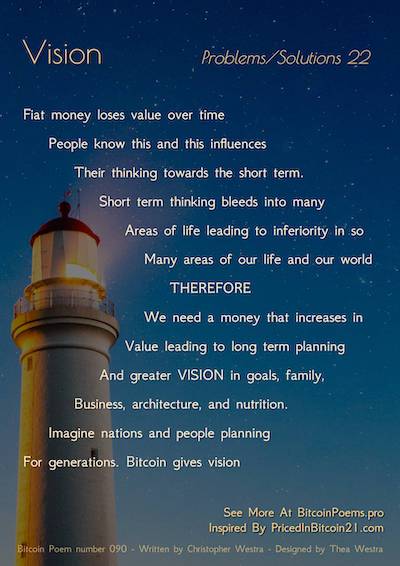
Bitcoin Poem 090 – Written 3/10/24
Vision (Problems/Solutions 022)
Inspired by: PricedInBitcoin21.com
Fiat money loses value over time
People know this and this influences
Their thinking towards the short term.
Short term thinking bleeds into many
Areas of life leading to inferiority in so
Many areas of our life and our world
Therefore
We need a money that increases in
Value leading to long term planning
And greater VISION in goals, family,
Business, architecture, and nutrition.
Imagine nations and people planning
For generations. Bitcoin gives vision

Imagine you have two different types of money: fiat money and Bitcoin. With fiat money, like the dollars or euros in your wallet, you know that over time, its value decreases. This means that if you save up a certain amount of fiat money today, it might not buy you as much in the future because prices tend to go up. So, when people have fiat money, they often think more about spending it quickly, before it loses even more value.
This short-term thinking can affect many aspects of life, from how we plan our goals to how we run our businesses.
On the other hand, Bitcoin is different. It's designed to be hard money, which means its value tends to increase over time. This encourages people to hold onto their bitcoins for the long term, rather than spending them right away.
When you know that the money you have today will be worth even more tomorrow, it changes your perspective. You start to think more about the future and plan for the long term. This can lead to greater vision and ambition in many areas of life, like setting goals for your family, building a business, designing architecture, or even choosing what to eat for better nutrition.
Imagine if nations and people could plan not just for years, but for generations ahead. Bitcoin gives us this vision because it's a form of money that encourages long-term thinking and planning.
With Bitcoin, we have the opportunity to build a better future for ourselves and future generations by making decisions that benefit us in the long run. So, by embracing Bitcoin as hard money, we can foster a culture of long-term planning and greater vision in all aspects of our lives and our world.
Here is a story to illustrate:
Evergold's Shadow: A Tale of Short-Term Thinking and the Bitcoin Revolution

In the bustling village of Evernow, two farmers, Wren and Kai, toiled under the golden sun. Wren, known for her bountiful harvests, dreamt of building a sturdy barn to weather the harsh winters. Kai, with a knack for innovation, envisioned a waterwheel to irrigate his fields more efficiently.
Both possessed the means to achieve their goals, but a shadow loomed over their ambitions – the village's currency, Evergold. Evergold, like most fiat money, steadily lost its value with each passing season. Knowing this, both Wren and Kai were hesitant to invest in long-term projects.
“Why build a strong barn when the Evergold to buy its wood might cost twice as much next year?” Wren lamented. Kai echoed her sentiment, “Why invest in a waterwheel when the Evergold to maintain it might dwindle with each harvest?”
This short-term thinking, fueled by the ever-depreciating Evergold, cast a long shadow over Evernow. Houses were built with cheap materials, businesses focused on quick profits, and families prioritized immediate needs over long-term investments in their children's education.
One day, a wandering merchant arrived, his caravan laden with strange digital tokens called “Bitcoins.” He explained that Bitcoins, unlike Evergold, were designed to be scarce and their value tended to increase over time.
Intrigued, Wren and Kai saw a glimmer of hope. With Bitcoins, they could plan for the future without the fear of their savings diminishing. Wren, with newfound confidence, invested in a sturdy barn, ensuring its longevity. Kai, inspired by the potential, built his waterwheel, knowing its benefits would extend far into the future.
As the years passed, Evernow transformed. Houses were built with stronger materials, businesses focused on sustainable practices, and families prioritized long-term investments in education and healthcare. This shift wasn't just about Bitcoins; it was about the change in mindset they brought.
With a currency that held its value, the villagers of Evernow began to think in generations, not just seasons. They built not just for themselves, but for their children and grandchildren, fostering a culture of long-term vision and planning that propelled their village towards a brighter future.
Problems and Solutions 23 - Consumption
You can see this full size poem on a background here.
Here is a small version.
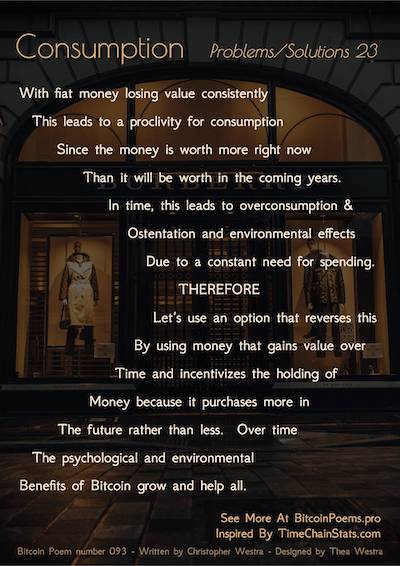
Bitcoin Poem 093 – Written 3/31/24
Consumption (Problems/Solutions 023)
Inspired by: TimeChainStats.com
With fiat money losing value consistently
This leads to a proclivity for consumption
Since the money is worth more right now
Than it will be worth in the coming years.
In time, this leads to overconsumption &
Ostentation and environmental effects
Due to a constant need for spending.
Therefore
Let’s use an option that reverses this
By using money that gains value over
Time and incentivizes the holding of
Money because it purchases more in
The future rather than less. Over time
The psychological and environmental
Benefits of Bitcoin grow and help all.
As we all know, inflation has become worse since 2020, as shown in the chart below.
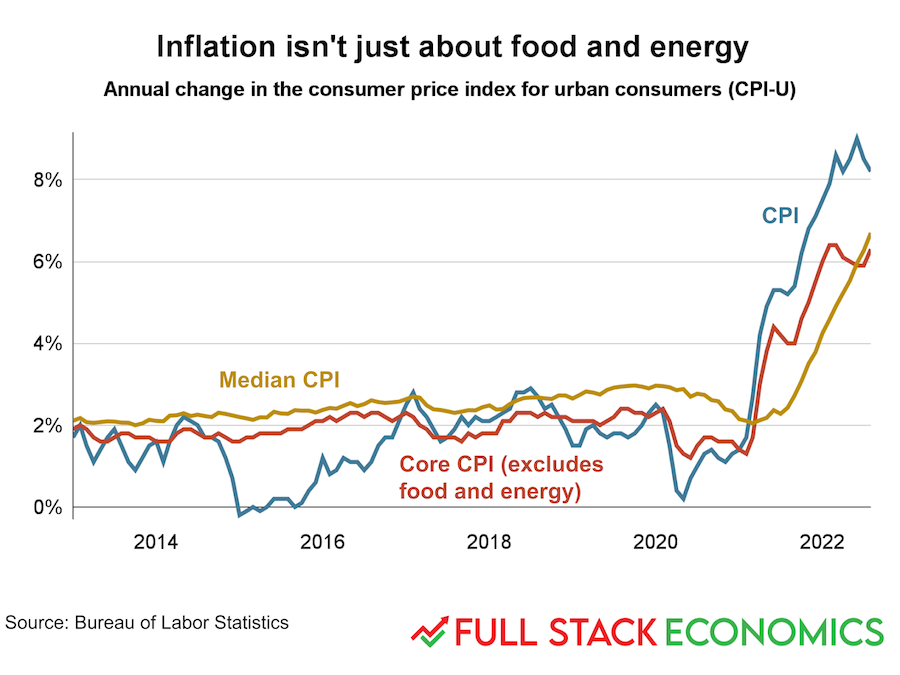
Chart above from the Full Stack Economics Website, with the data coming from the Bureau of Labor Statistics
Shiny Objects vs. the Golden Strategy: Lily and Max's Journey

Once upon a time, in a bustling town nestled between rolling hills, there lived two friends named Lily and Max. They both worked hard at their jobs, earning a modest income every month. Lily was a big fan of the latest gadgets and trendy clothes, while Max preferred to save his money for a rainy day.
Lily loved spending her money as soon as she earned it. Whenever a new smartphone hit the market or a flashy sale popped up at the mall, she couldn't resist splurging on the latest tech and fashion. She enjoyed the thrill of instant gratification, but over time, she noticed something troubling. Despite all her purchases, she never seemed to have much to show for it in the long run. The things she bought quickly lost their charm, and she found herself constantly chasing the next shiny object.
Max, on the other hand, had a different approach to money. He was intrigued by the idea of saving and investing for the future. Instead of spending all his earnings right away, he set aside a portion each month and put it into a special savings account. But what made his strategy even more successful was his discovery of Bitcoin.
Unlike fiat money, which loses value over time due to inflation, Bitcoin had a unique property – it tended to increase in value over time. Max realized that by holding onto his bitcoin, he could actually increase his purchasing power in the future. This realization changed his perspective on money. Instead of seeing it as something to be spent frivolously, he viewed it as a tool for building wealth and securing his future.
As the years went by, Lily noticed a stark contrast between her lifestyle and Max's. While she struggled with mounting debt and the constant need for more, Max thrived, steadily growing his savings and investments. He was able to afford things that truly mattered to him, like buying a home and starting his own business.
The story of Lily and Max illustrates how money that loses value over time can lead to excessive consumption and short-term thinking, while money that increases in value encourages savings and long-term planning. By embracing Bitcoin, we can reverse this trend and create a more sustainable and prosperous future for ourselves and the world around us.
Problems and Solutions 24 - Perfect Scarcity
You can see this full size poem on a background here.
Here is a small version.
Bitcoin Poem 095 – Written 4/17/24
Perfect Scarcity (Problems/Solutions 024)
Inspired by: Dante at Swan Bitcoin
Hundreds of items have been used
For money over the course of history.
Yet they cease being money when
They cease being scarce, through
New technology, along with greed.
No tangible item has true scarcity
Therefore
What we need is digital scarcity.
Digital content is usually easy to
Replicate and therefore not scarce.
So we need a system that is digital
Yet also perfectly limited in supply
Bitcoin’s the digital scarce solution
Here are some examples of items used as money through the centuries.
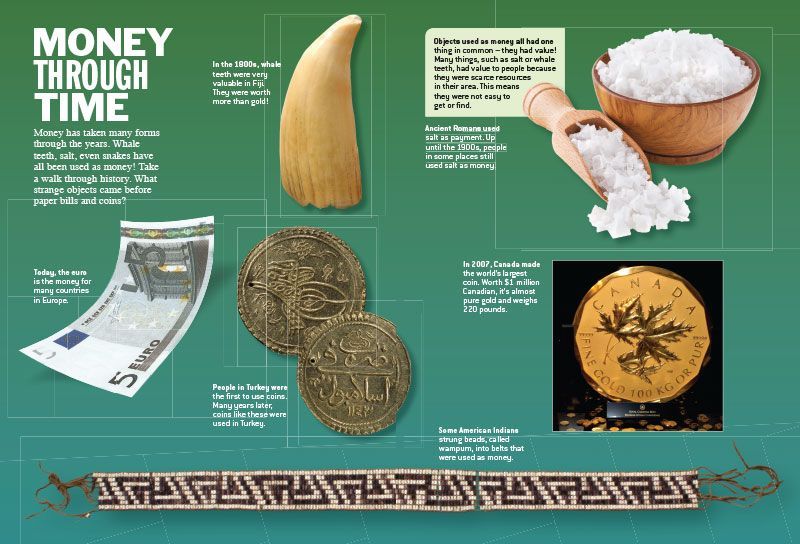
Throughout history, people have used many different things as money, like shells, glass beads, feathers, and even buckskins. These items became valuable because they were scarce – there weren't too many of them around. But as time went on and new technologies emerged, some of these items stopped being scarce. This happened because people found ways to produce more of them, or they simply lost their value over time due to greed and overuse.
The problem with using tangible items as money is that they can lose their scarcity. When something isn't scarce anymore, it stops being valuable as money. This is where Bitcoin comes in. Bitcoin provides a solution to this problem with something called perfect scarcity.
Bitcoin is a digital currency, which means it exists only in the digital world. Unlike physical items that can be replicated or produced endlessly, Bitcoin is designed to be perfectly limited in supply. There will only ever be 21 million bitcoins in existence, and no one can create more of them. This ensures that Bitcoin remains scarce, even scarcer than gold or other precious metals.
When the price of gold goes up, additional mining is pursued to create more. Bitcoin is the only “commodity” whose supply can’t be altered by increased demand.
The beauty of Bitcoin's digital scarcity is that it's not subject to the same limitations as tangible items. Digital content, like music or movies, can be easily copied and shared, making it difficult to maintain scarcity. But Bitcoin's scarcity is built into its very code, making it impossible to create more bitcoins beyond the predetermined limit.
So, while hundreds of items have been used as money throughout history, Bitcoin stands out as a digital scarce solution. Its perfect scarcity ensures that it remains valuable and trustworthy, even in a world where technology is constantly evolving. With Bitcoin, we have a digital currency that combines the convenience of digital content with the scarcity of precious metals, offering a new and innovative way to store and exchange value.
The Curse of Plenty: A Story of Inflation and the Search for a Scarce Solution

On the bustling trade route of the Whispering Trees, a menagerie of merchants bartered their wares. One offered shimmering seashells, another, intricately carved stones. But these weren't mere trinkets; they were the currencies of their time.
For generations, the value of these items held steady. However, whispers turned to shouts as a new technology emerged – the Great Shell Scooper. It could scoop vast quantities of shells from the ocean floor, flooding the market. Seashells, once valuable, became common, and their buying power plummeted.
A similar fate befell the carved stones. Greedy miners, armed with powerful chisels, began churning them out at an alarming rate. Soon, the stones lost their exclusivity, and merchants found themselves struggling to buy basic necessities.
Disheartened, the traders gathered around a wise old nomad named Zahra. “True money,” she explained, “needs scarcity built into its very essence, not just its availability.”
One young merchant, Amal, chimed in with a glimmer in his eye. He had encountered a distant tribe that spoke of a revolutionary system – “Starlight Tokens.” These tokens, he explained, were digital, existing only on a vast, secure network. But the most remarkable feature was their finite quantity. There would only ever be a set number of Starlight Tokens in existence.
Intrigued, the traders decided to learn more. They discovered a system where complex puzzles guarded the creation of new tokens, ensuring a slow and steady release. This digital scarcity, unlike the unpredictable nature of physical items, offered a solution to their woes.
The Whispering Trees embraced the Starlight Token system. With a predictable supply, merchants and traders could plan for the future. The tokens' digital nature allowed for secure and fast transactions.
The once-troubled trade route flourished, a testament to the power of digital scarcity in a world increasingly reliant on the digital realm. As Amal had hoped, the Starlight Tokens, scarce by design, became a beacon of stability in their ever-changing world.
Problems and Solutions 25 - Wasted Energy
You can see this full size poem on a background here.
Here is a small version.
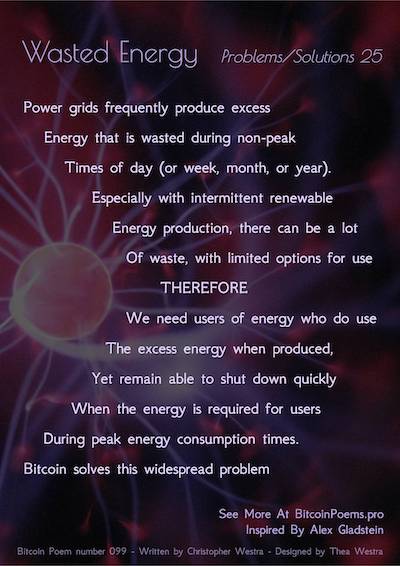
Bitcoin Poem 099 – Written 5/16/24
Wasted Energy (Problems/Solutions 025)
Inspired by: Alex Gladstein
Power grids frequently produce excess
Energy that is wasted during non-peak
Times of day (or week, month, or year).
Especially with intermittent renewable
Energy production, there can be a lot
Of waste, with limited options for use
Therefore
We need users of energy who do use
The excess energy when produced,
Yet remain able to shut down quickly
When the energy is required for users
During peak energy consumption times.
Bitcoin solves this widespread problem
Here is a story to illustrate:
Nighttime Grind: The Water Wheels that Saved the Day (and the Flour)

In a small village nestled in the hills, there was a magical river that provided water to all the villagers. The river always flowed, but its currents were strongest during certain times of the day and certain seasons. At night and during rainy seasons, the river would swell, carrying much more water than the villagers needed. This excess water often flowed away unused, spilling over the banks and being wasted.
The village elders were concerned about this waste. They knew that during the day, when everyone was awake and active, there was often just enough water for all the villagers' needs. But at night, when everyone was asleep, the river overflowed. “What can we do to avoid wasting this precious water?” they wondered.
One day, a clever young woman named Lyra came up with an idea. She proposed building a series of water wheels along the riverbanks. These water wheels would turn and grind grain into flour whenever the river's flow was strong. This way, the extra water at night wouldn't be wasted. Instead, it would power the water wheels and provide the village with flour.
But there was another part to Lyra's plan. The water wheels could be stopped easily if the village needed more water for drinking, cooking, or washing during the day. If the river's flow decreased, the wheels would halt, ensuring that the villagers always had enough water for their immediate needs.
The villagers agreed to try Lyra's idea. They built the water wheels, and soon they noticed a remarkable change. The water wheels turned tirelessly through the night, grinding grain and using the river's surplus power. During the day, when the villagers needed more water, they could simply stop the wheels. This balance allowed the village to use the river's power efficiently, reducing waste and ensuring a steady supply of flour and water.
Just like the water wheels in Lyra's village, Bitcoin miners use excess energy from power grids. They run their operations when there's surplus energy, especially from sources like wind and solar power. And just like the water wheels that could stop when water was needed elsewhere, Bitcoin miners can quickly reduce their energy consumption when the grid needs more power for homes and businesses.
This helps balance energy use, reduces waste, and makes the entire system more efficient.
Bitcoin Solutions is Sponsored by Prosperity Poems